Recap IDSF 2023
For those who were not able to attend our live event, want to review their favorite talk or get inspired we put together videos of all recorded IDSF panel discussions here.
Our impressions section hosts web resolution images of IDSF 2023.
Please make sure to always credit the relevant photographer.
Welcome & Opening Ceremony
International Digital Security Forum (IDSF) 2023 in Vienna

Opening Ceremony
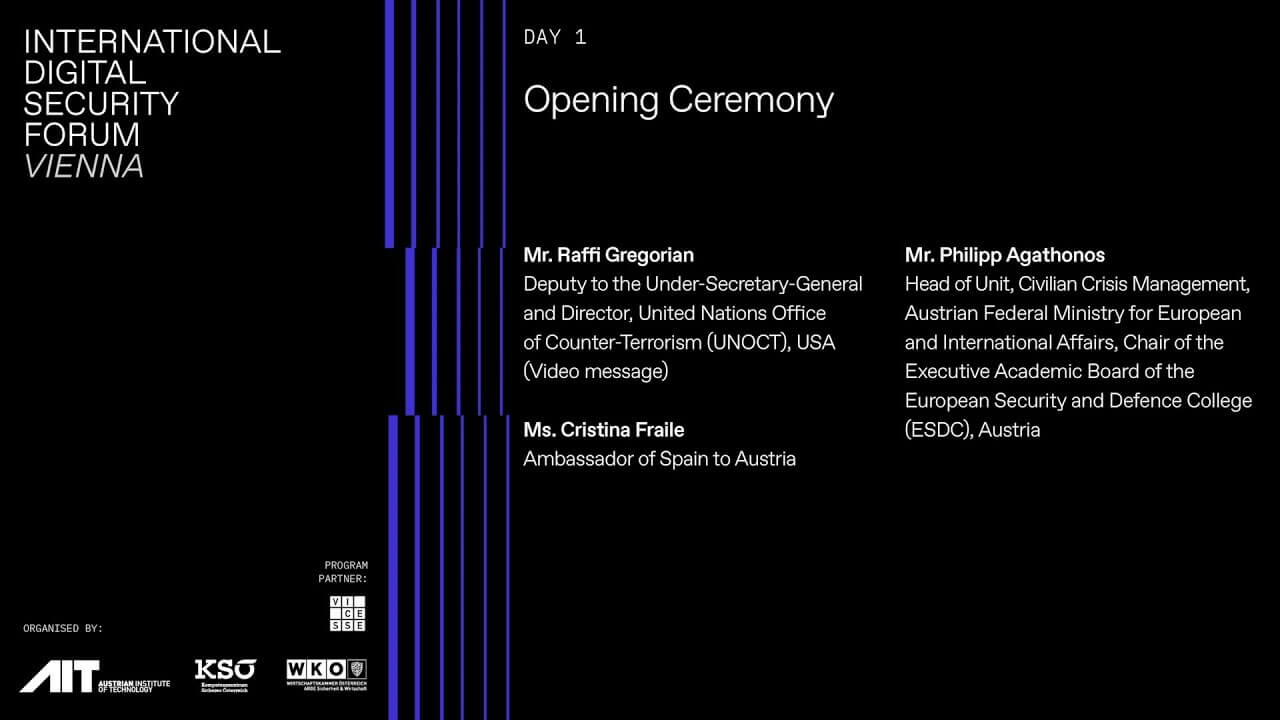
Mr. Karl Nehammer, Federal Chancellor at Republic of Austria (Welcome Message),
Mr. Raffi Gregorian, Deputy to the Under-Secretary-General and Director, United Nations Office of Counter-Terrorism (UNOCT),
Ms. Cristina Fraile, Ambassador of Spain to Austria
SESSION TRACK 1 – Responsible Technology Development
Introduction Session Track 1: Responsible Technology Development
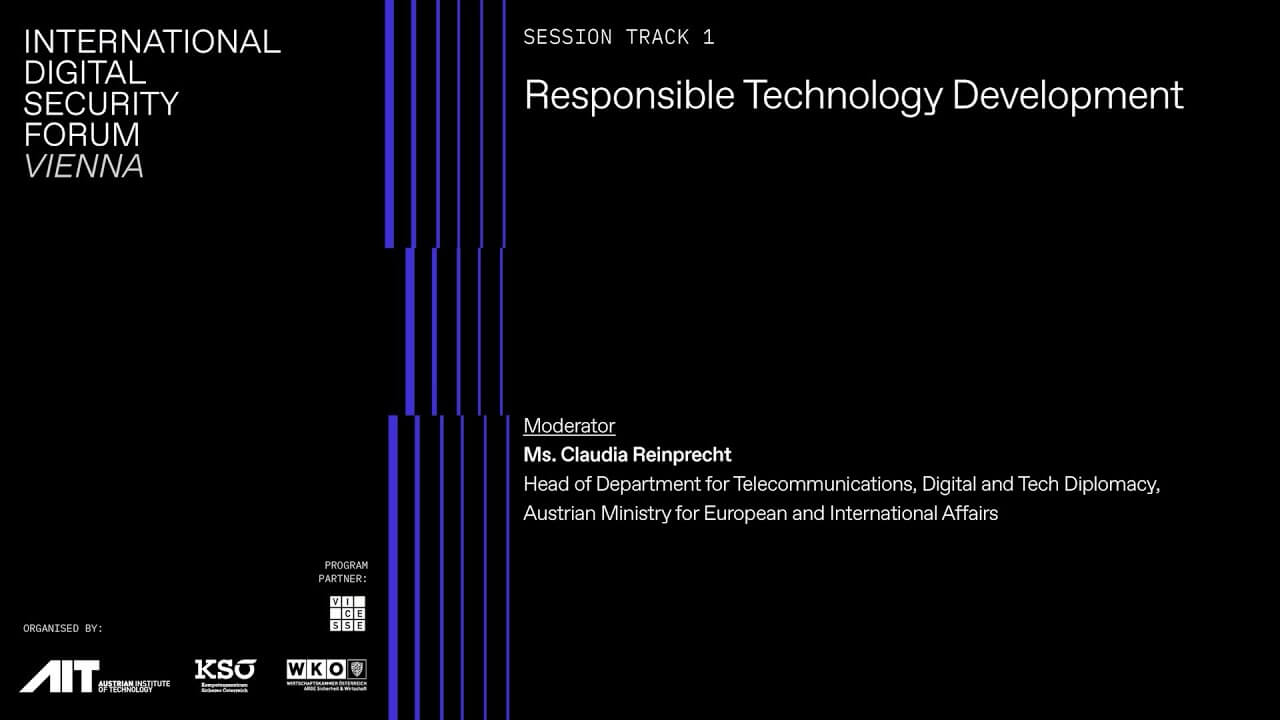
Ms. Claudia Reinprecht, Head of Department for Telecommunications, Digital and Tech Diplomacy, Austrian Ministry for European and International Affairs
KEYNOTE
The role of the Council of Europe in the global governance of AI and other emerging technologies – and its geopolitical implications.
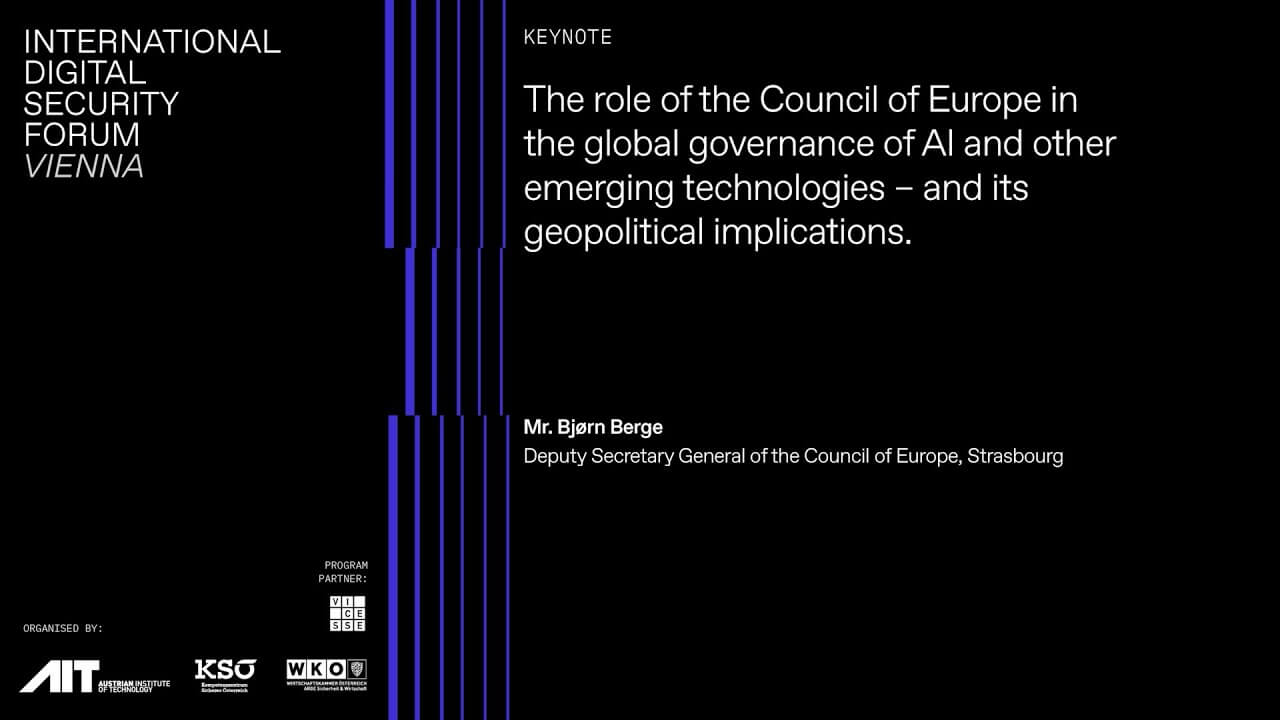
Mr. Bjørn Berge, Deputy Secretary General of the Council of Europe, Strasbourg
The relentless advance of technology is opening our eyes to possibilities that humankind has never before contemplated. Supporting this progress in a way that is ethical and upholds individuals’ rights is a cross-border challenge that requires a multilateral response. On everything from data protection to the prevention of cybercrime and the regulation of AI, international responses are essential and available. This is where the Council of Europe plays a key role.
SESSION 1.1
Tech Diplomacy in the 21st Century: Navigating Geopolitics, Innovation, Governance, and Ethics
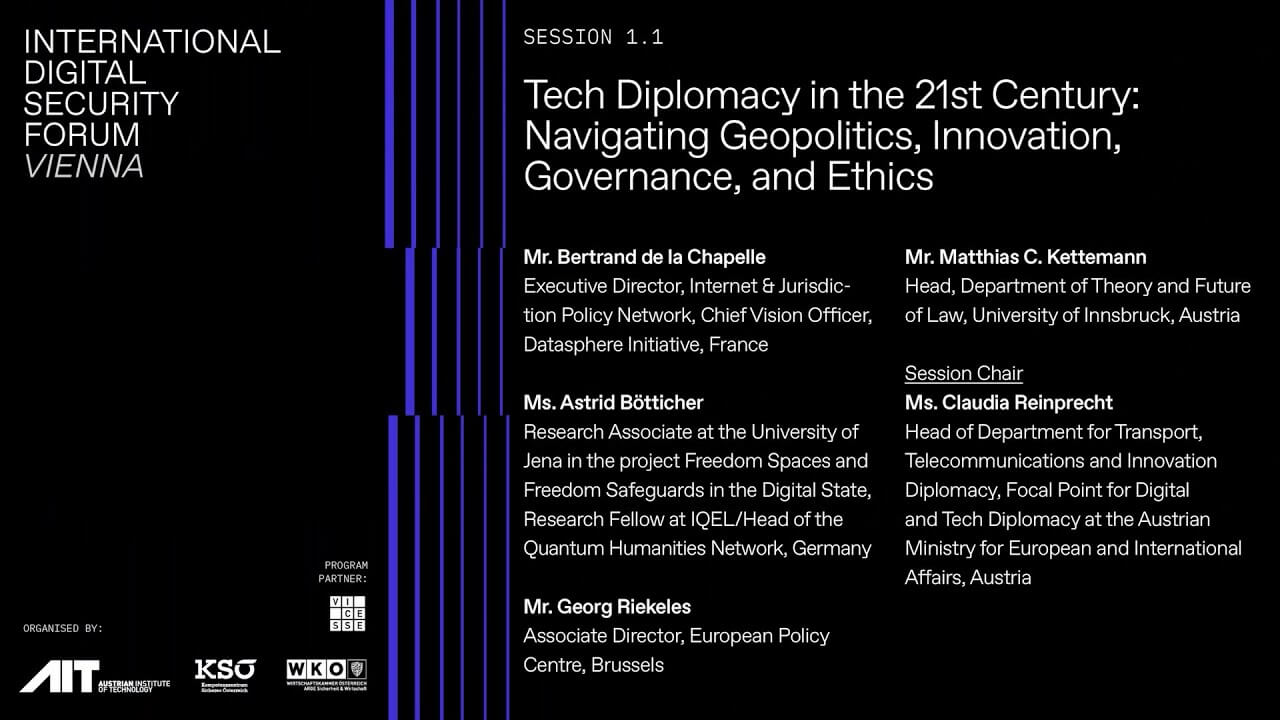
Session Panelists:
Mr. Bertrand de la Chapelle,
Ms. Astrid Bötticher,
Mr. Georg Riekeles,
Mr. Matthias C. Kettemann
Session Chair:
Ms. Claudia Reinprecht
Throughout history, technologies and innovation have changed the past, transformed societies and economies as well as have shaped power relations among states. In the same vein, the emergence of new and potentially disruptive technologies, such as quantum technologies, AI enabled systems and machine-learning technologies, are having a profound impact on peace and security, human rights and sustainable development. This relates not only to military or economic power but also to narratives on rules-based, open and democratic societies based on human rights and fundamental freedoms. It also relates to question of distribution of power among states and among communities.
In this context, in order to gain or maintain the technological edge, taking the global lead on norm and standard setting on these technologies has become part of the international agenda. The EU has sought to position itself as a global rule maker in the digital transformation and largely stayed out of the engagement in power politics of AI and quantum. But the recent discourse on technological sovereignty and open strategic autonomy as key elements of foreign policy has gained momentum. Security, economic security and technology development have become defining features of international cooperation in a more and more fragmented and regionalised world.
The panel seeks to explore different dimensions as to how technologies shape geopolitics and international relations. It also seeks to understand how to better position the EU in this difficulty geopolitical environment. Key questions relate to how global governance can achieve the core objectives of the international community to maintain peace and security, protect rights of individuals and communities, as well as advance the achievement of sustainable development.
SESSION TRACK 2 – Artificial Intelligence (AI)
Keynote
AI, Cybercrime and Human Scale
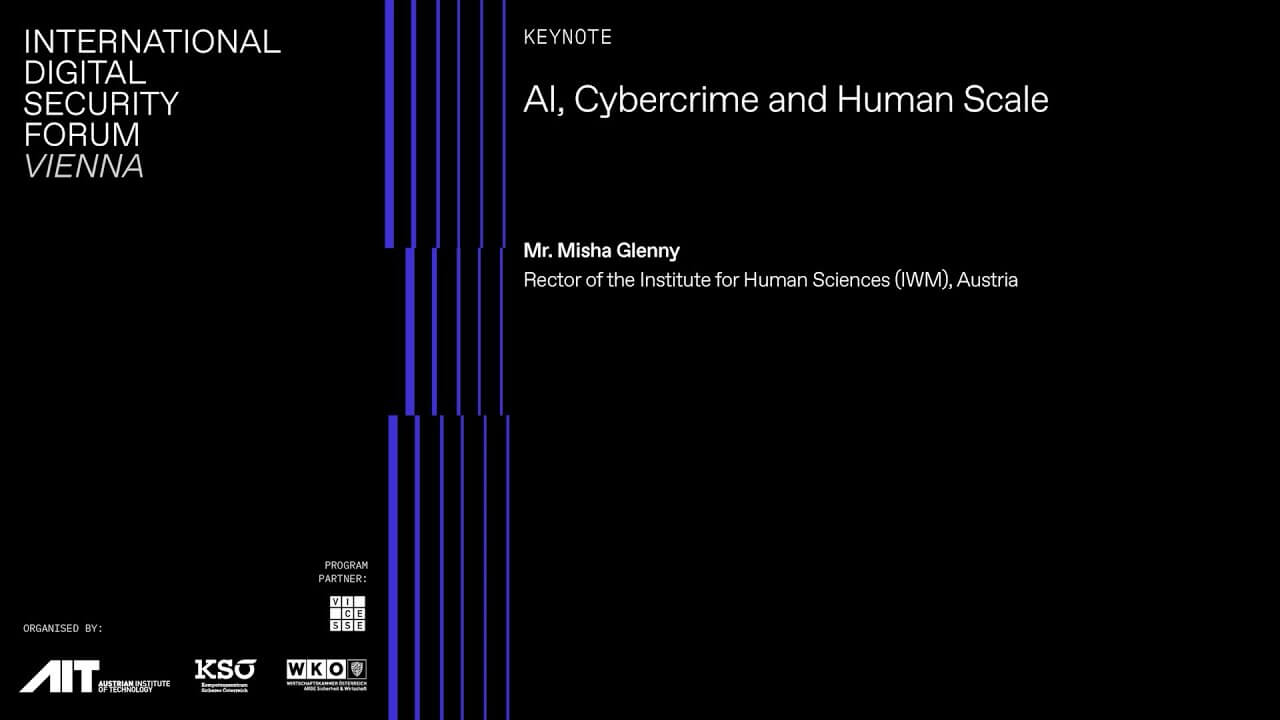
Mr. Misha Glenny, Rector of the Institute for Human Sciences (IWM), Austria
The political and social consequences of the Reformation were intimately linked with profound changes in technology that had taken place in the previous 100 years. Central to the intellectual revolution of the Renaissance was the humanist idea of human scale. Since then, we have struggled to balance the requirements of progress with those of scale. The advent of the personal computer has accentuated this challenge as never before. Not only have crises proliferated since the 1990s, the Decade of Delusion, but the loss of human scale has magnified their impact. The need to control technology and return to human scale is now an imperative, especially in light of the ever increasing power and pervasiveness of Artificial Intelligence and its use in Cybercrime.
Session 2.1
Trustworthy and Socially Responsible AI
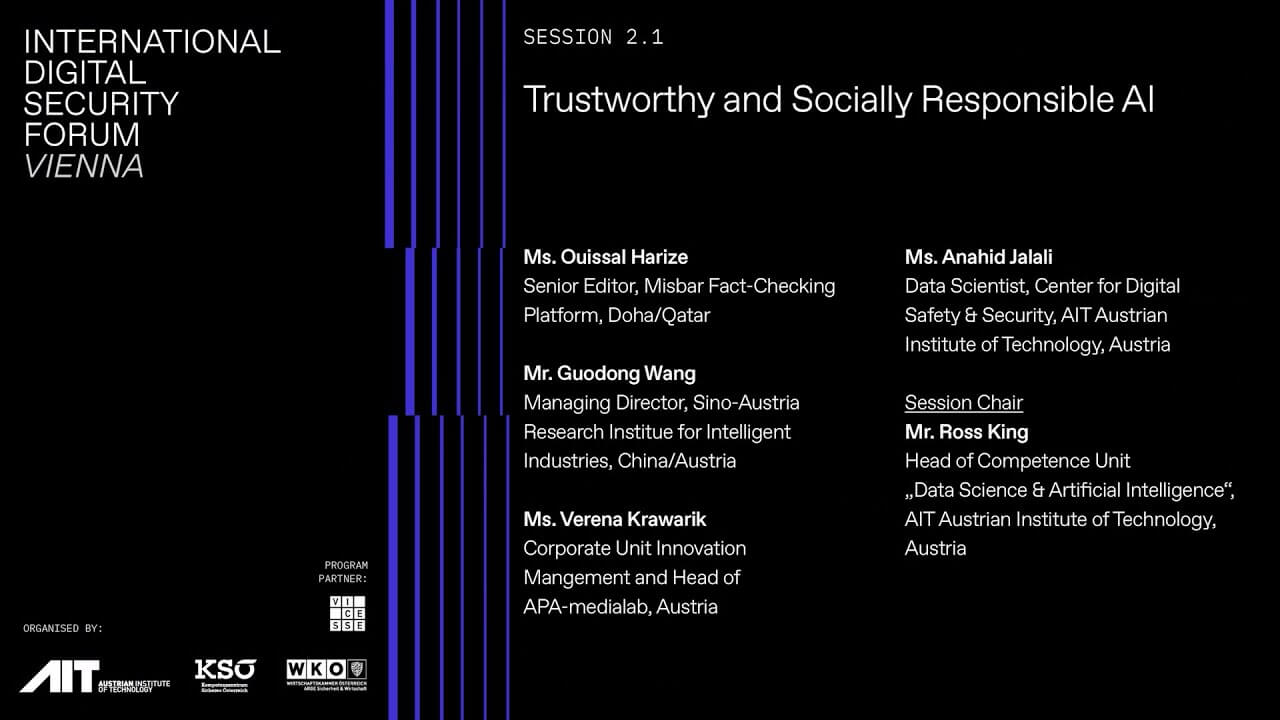
Session Panelists:
Ms. Ouissal Harize,
Mr. Guodong Wang,
Ms. Verena Krawarik,
Ms. Anahid Jalali
Session Chair:
Mr. Ross King
Ms. Ouissal Harize, Mr. Guodong Wang, Ms. Verena Krawarik, Ms. Anahid Jalali, Mr. Ross King
European values demand the development and deployment of AI systems that prioritize ethics, transparency, fairness, and accountability, while fostering trust and benefiting society. As AI technologies become increasingly complex, understanding how they arrive at decisions becomes vital.
In this panel, we will explore the evolving legal frameworks such as the coming AI Act and ethical considerations that shape socially responsible AI practices. This includes the crucial aspect of explainability in socially responsible AI. The panel will also address the issue of Large Language Models and their potential role in the propagation of disinformation. By examining the impact of AI on content generation and recommendation systems, we can develop a better understanding of the ethical and societal implications of artificial intelligence and employ methods to safeguard the integrity of information in the digital era.
Opening Speech Day 2
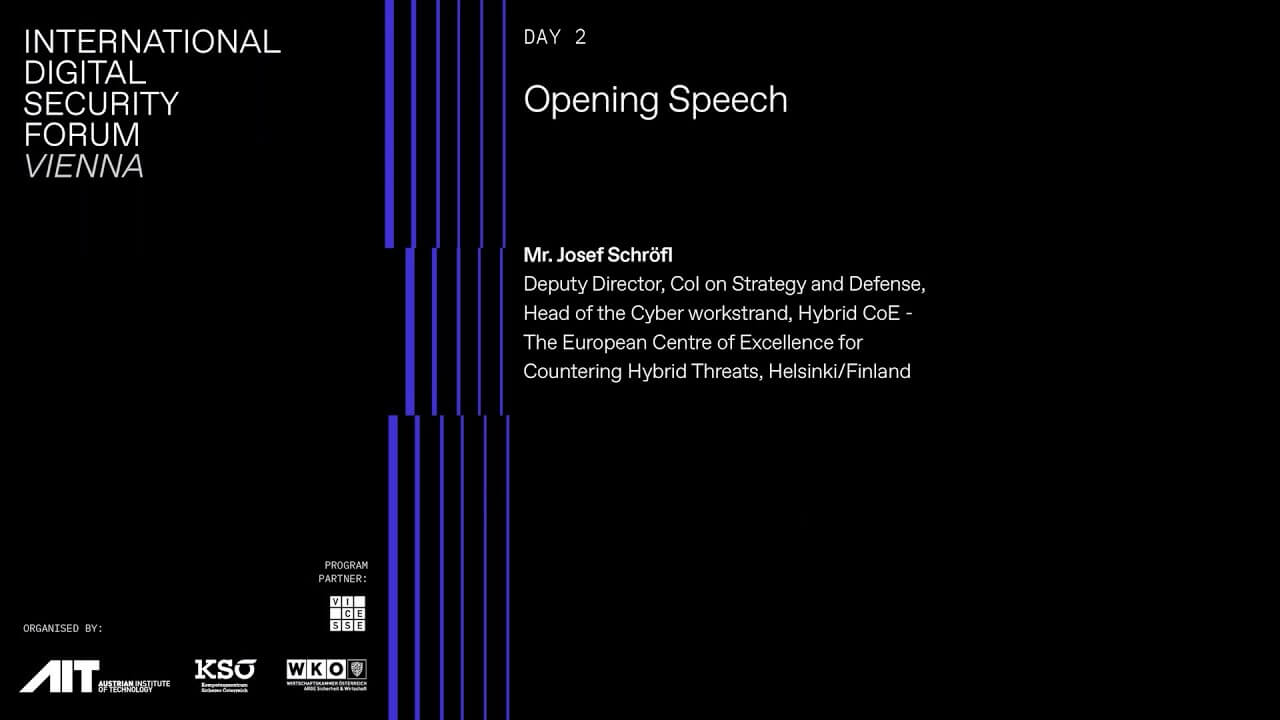
Mr. Josef Schröfl, Deputy Director, CoI on Strategy and Defense, Head of the Cyber workstrand, Hybrid CoE – The European Centre of Excellence for Countering Hybrid Threats, Helsinki/Finland
KEYNOTE
Operation of critical infrastructures in difficult environments based on the example of Ukraine
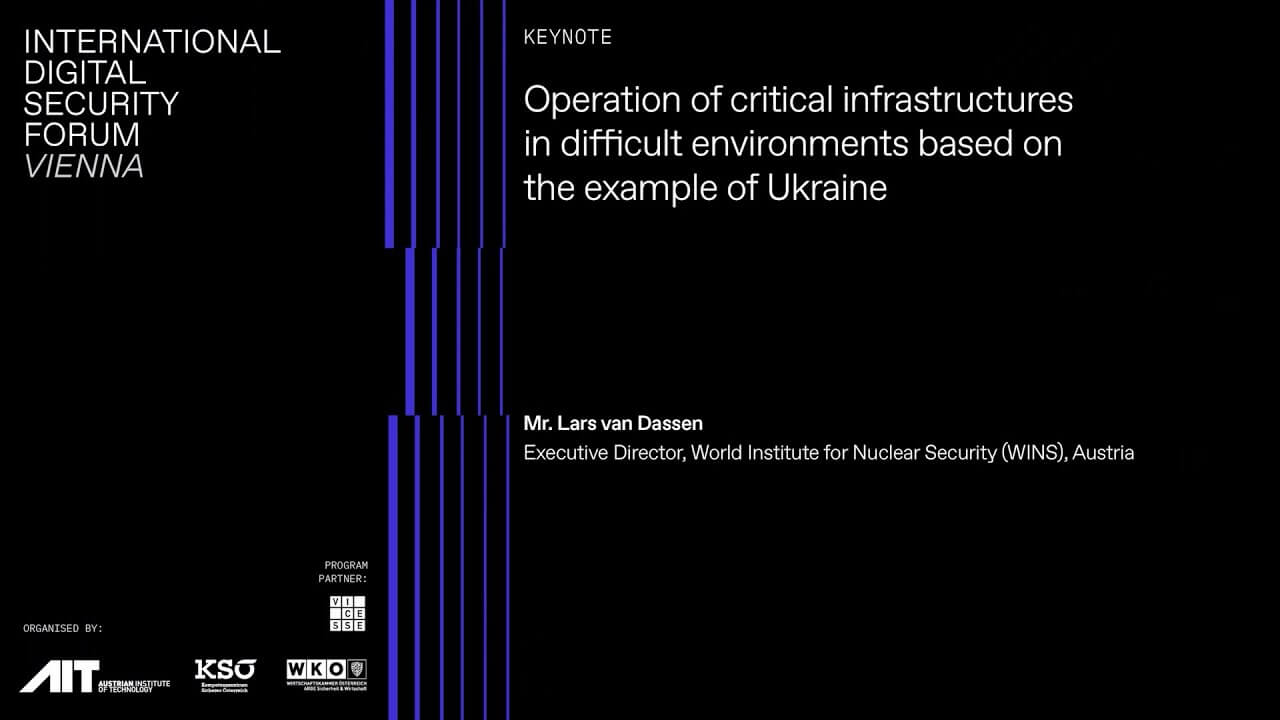
Mr. Lars van Dassen, Executive Director, World Institute for Nuclear Security (WINS)
SESSION TRACK 3 – Modern Crisis, Conflict and Disaster Management
SESSION 3.1
Digital Transformation of Crisis and Disaster Management: Meeting the Challenges of Transnational Threats
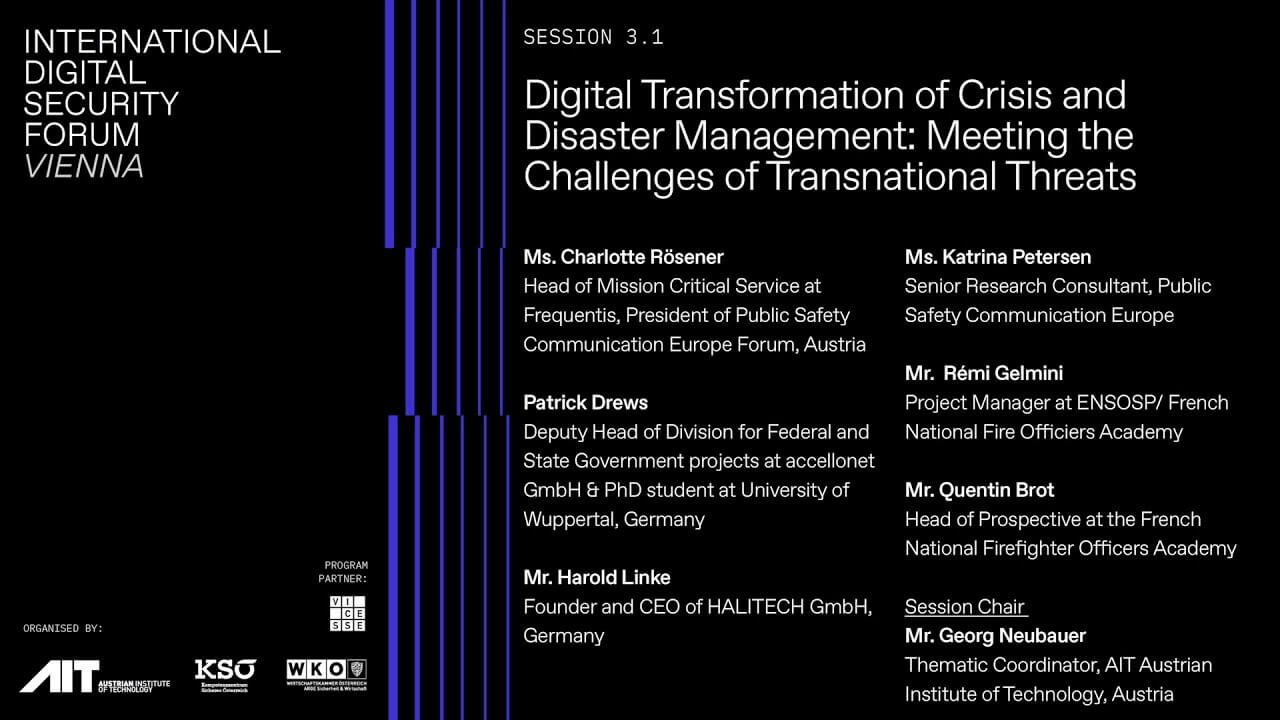
Session Panelists:
Ms. Charlotte Rösener,
Patrick Drews,
Ms. Katrina Petersen,
Mr. Remi Gelmini,
Mr. Quentin Brot,
Mr. Harold Linke
Session Chair:
Mr. Georg Neubauer
Nowadays, the civil society is facing a multitude of threats that are increasing both in type and frequency. This type of challenges is requiring complex and dynamic coping strategies. Such threat scenarios need an enhanced focus on preparedness, taking into account an increasing number of unknowns. Two central pillars in that context are cooperation and knowledge management. This encompasses cross border information exchange and data management which are imperative for successful crisis and disaster management. The challenges faced during the management of COVID-19 made multiple gaps visible encompassing the capabilities for interoperability as well as methodologies and facilities for data fusion of very different types of data. Such data encompass for instance medical information, status of infrastructures and availability of resources, sensor data or outcomes of modelling procedures as a basis for achieving a common situational awareness.
Apart from the need for enhanced cooperation it turned out in the last years, that the level of preparedness needs to be enhanced. For this purpose, solid methodologies for evaluation of performance are requested to enable improved crisis and disaster management, both of first and second responders acting in the field as well as the equipment applied. Digital solutions for performance validation have the capability to pave the way to enhanced crisis and disaster management. In general terms, there is need to identify best possible solutions for actors being exposed in disaster prone areas.
The identification of best possible capabilities requests knowledge management supported by recent digital evolutions such as AI. At this stage, a major focus in crisis and disaster management is to enhance solutions for decision support. In the close future, there is need to move toward a new digital ecosystem realising elements such as chain of trust, governance of cooperation or digital sovereignty. This evolution makes it possible to move more and more away from obstacles such as isolated silo thinking towards data economy, supported by common standards.
SESSION 3.2
Technological Innovation and Civilian Crisis & Conflict Management: Developing the Peace-Security-Technology Nexus
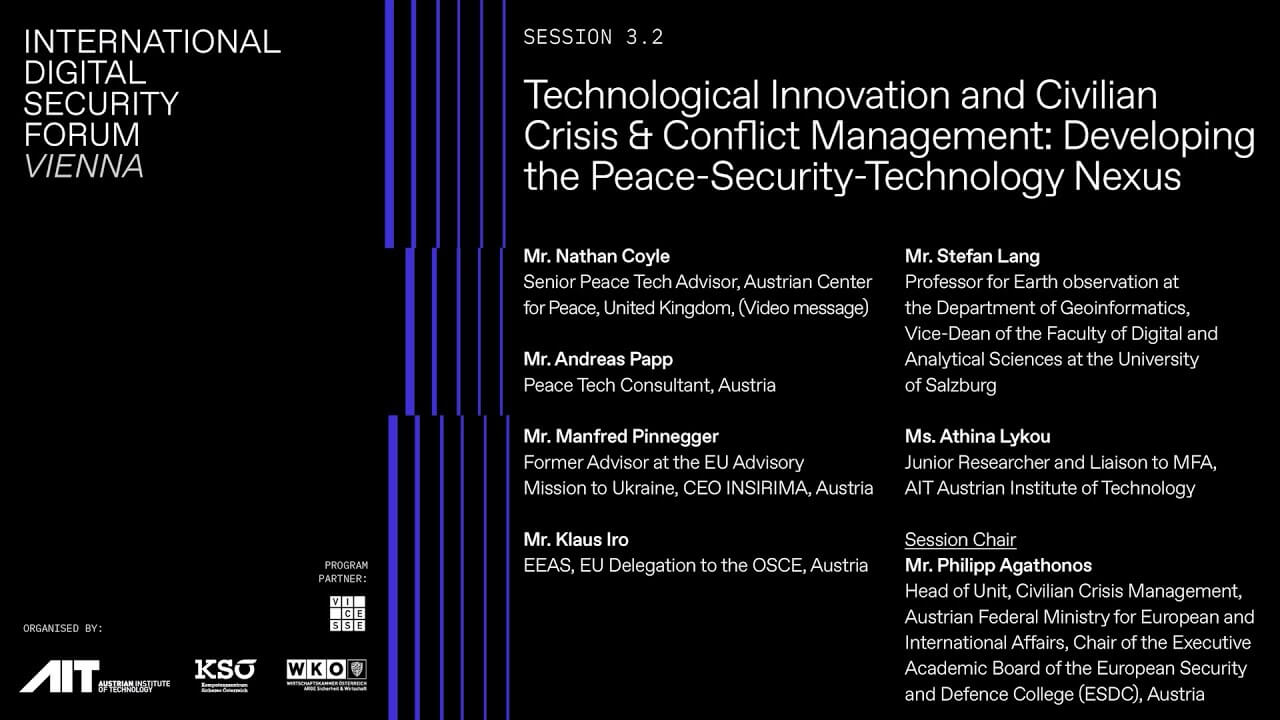
Session Panelists:
Mr. Nathan Coyle,
Mr. Andreas Papp,
Mr. Manfred Pinnegger,
Mr. Klaus Iro,
Mr. Stefan Lang,
Ms. Athina Lykos
Session Chair:
Mr. Philipp Agathonos
As conflicts are changing with new technologies and moving fluidly between the world we live in and the cyber realm, state-of-the-art technologies play a central role in modern, increasingly atypical forms of conflict. Digital technologies form an increasingly important part of the political landscape of conflicts. Digital activism is on the rise and the internet is used to initiate and drive popular movements.
The ongoing fourth industrial revolution (Industry 4.0), centred on the digitization of processes and the fusion of technologies, affects all aspects of human interaction, including Civilian Crisis and Conflict Management. As the lines between the physical, digital, and biological spheres become blurred, the Peace-Security-Technology nexus must receive our full attention.
EU, UN, OSCE and other actors in this increasing field include the digital ecosystem surrounding them in their analysis and their strategic and operational plans. Has the time come to transform traditional UN peacekeeping operations, EU CSDP missions and operations or OSCE field missions into “smart missions”, based on state-of-the-art technological innovations? How can various tools and processes, such as social media, geographic information systems, data analytics, virtual reality frameworks and other digital technologies provide added-value in international efforts in civilian crisis and conflict management?
Keynote
Digital Resilience
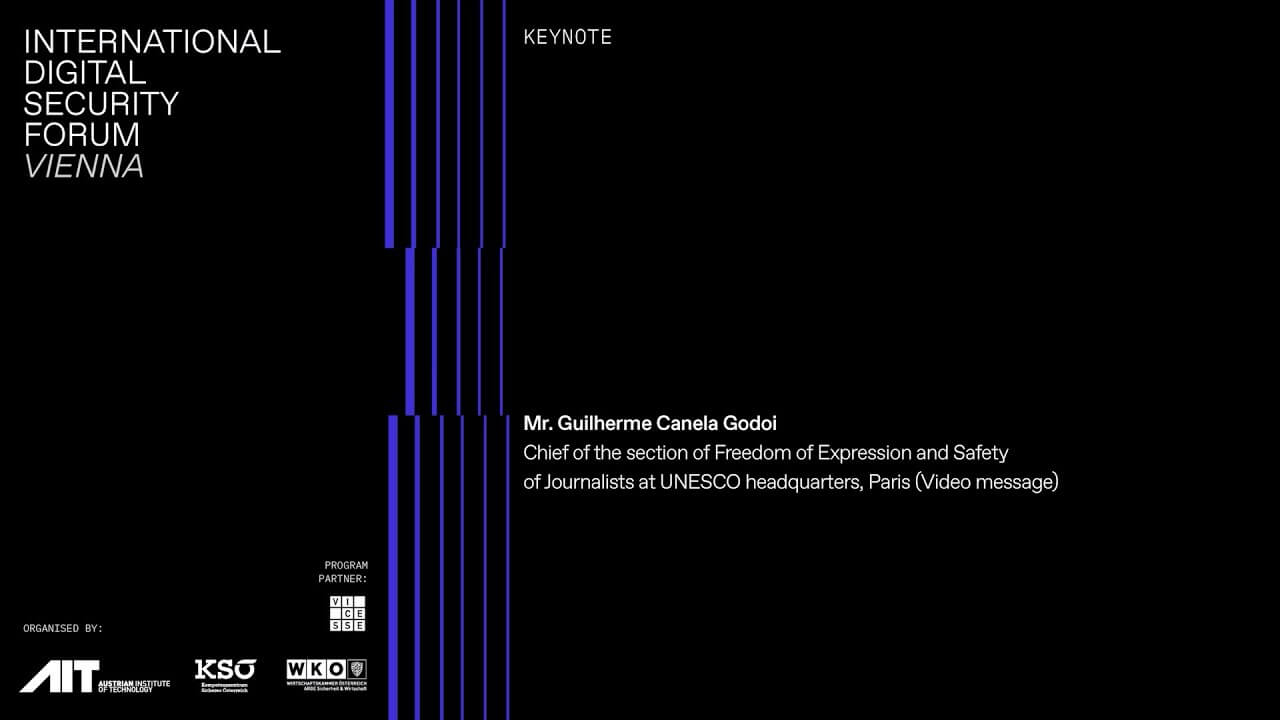
Mr. Guilherme Canela Godoi, Chief of the section of Freedom of Expression and Safety of Journalists at UNESCO headquarters, Paris (Video Message)
SESSION TRACK 4 – Advancing Global Security Through Digital Innovation
Session 4.1
Fighting against Organized Crime in the Digital Era: Tools, Technologies, and Strategies
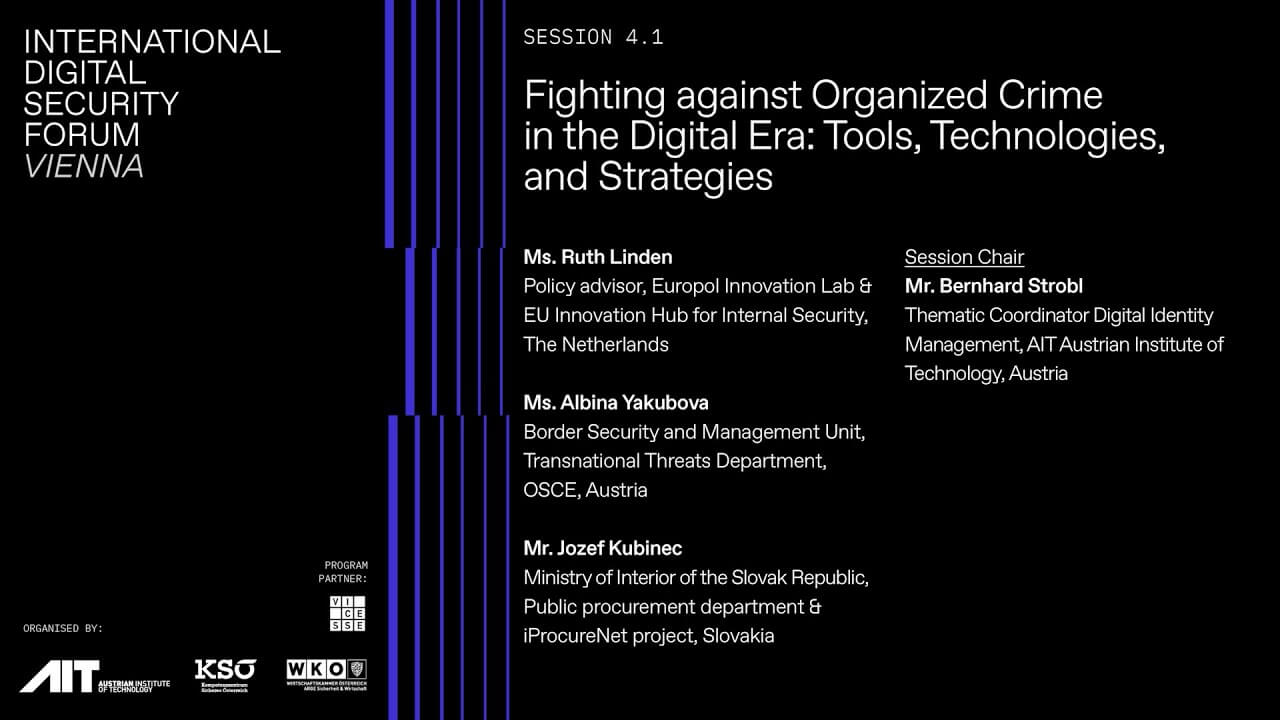
Session Panelists:
Ms. Ruth Linden,
Ms. Albina Yakubova,
Mr. Jozef Kubinec
Session Chair:
Mr. Bernhard Strobl
Border security faces a wide range of challenges. Adapting to evolving threats such as terrorism, transnational crime and drug trafficking necessitates the implementation of proactive measures and the sharing of intelligence among relevant stakeholders. Moreover, cross-border cooperation is critical to prevent criminals from exploiting jurisdictional gaps and conducting illicit activities across borders.
In order to operate border security effectively, it is also essential to have skilled personnel who receive regular training on emerging threats and technologies. In summary, effective migration management, cross-border cooperation, public confidence, skilled personnel, privacy protection, simplified procurement processes and international cooperation are essential to ensure robust border security in an ever-changing world.
Session 4.2
Innovations and Services for Counter-Terrorism Strategies
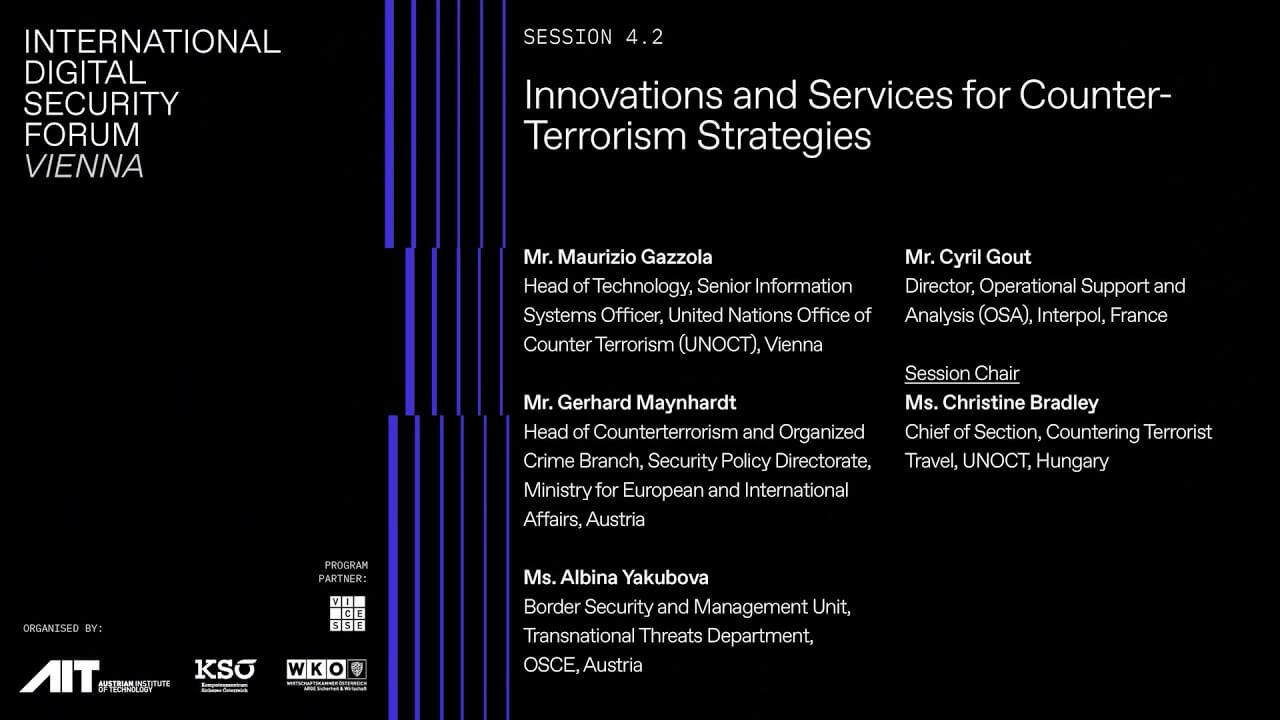
Session Panelists:
Mr. Maurizio Gazzola,
Mr. Gerhard Maynhardt,
Ms. Albina Yakubova,
Mr. Cyril Gout
Session Chair:
Ms. Christine Bradley
Introduction on the importance of digitalization in the field of counter-terrorism. Presentation of the UNOCT’s CT Travel Programme as a best practice in border management, as well as discussion among different stakeholders on the complementarity of mandates and international cooperation.
Session 4.3
Responsible Digital Identity Management: Technologies for the Promotion of Data Protection
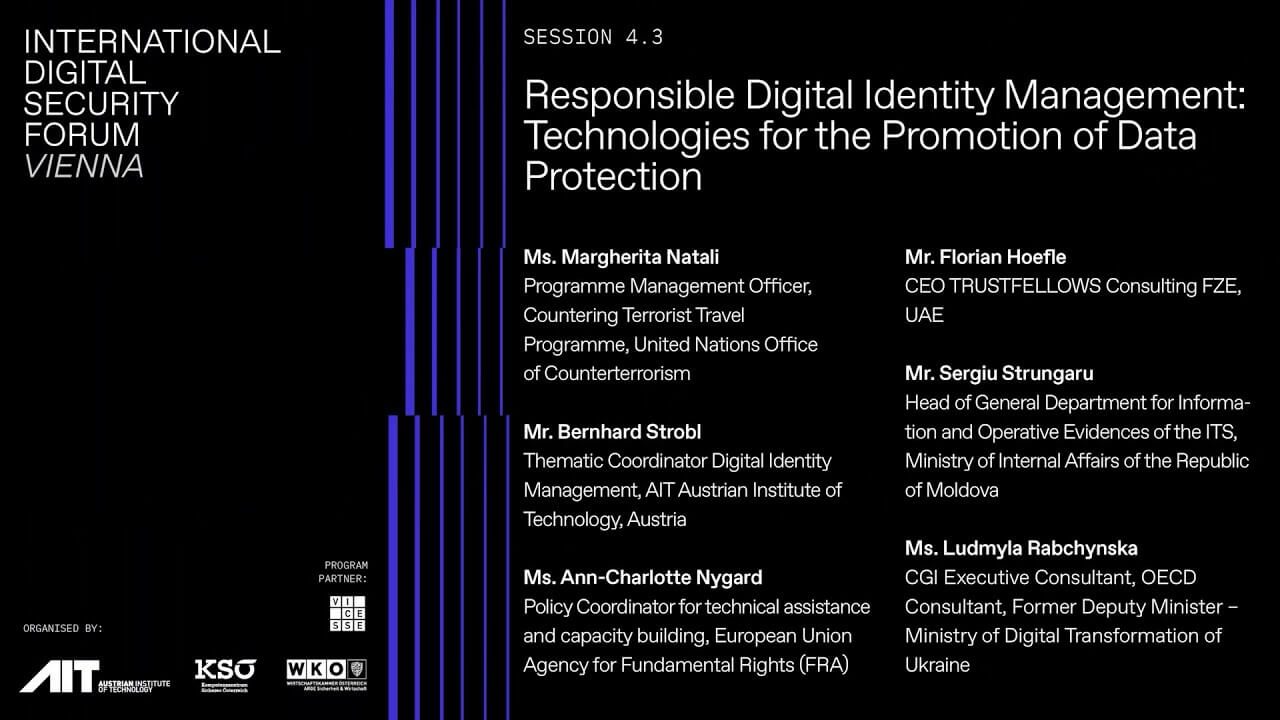
Session Panelists:
Ms. Margherita Natali,
Mr. Bernhard Strobl,
Ms. Ann-Charlotte Nygard,
Mr. Florian Hoefle,
Mr. Sergiu Strungaru
Session Chair:
Ms. Ludmyla Rabchynska
A responsible use of personal data in digital identity management is possible through adequate safeguards in regulation and technological solutions. This session will explore risks and opportunities associated with technology in the field of security, while protecting and promoting Privacy and Data Protection.
KEYNOTE
Cyberattacks and Reliability of Digital Infrastructure in the context of Russian Invasion in Ukraine
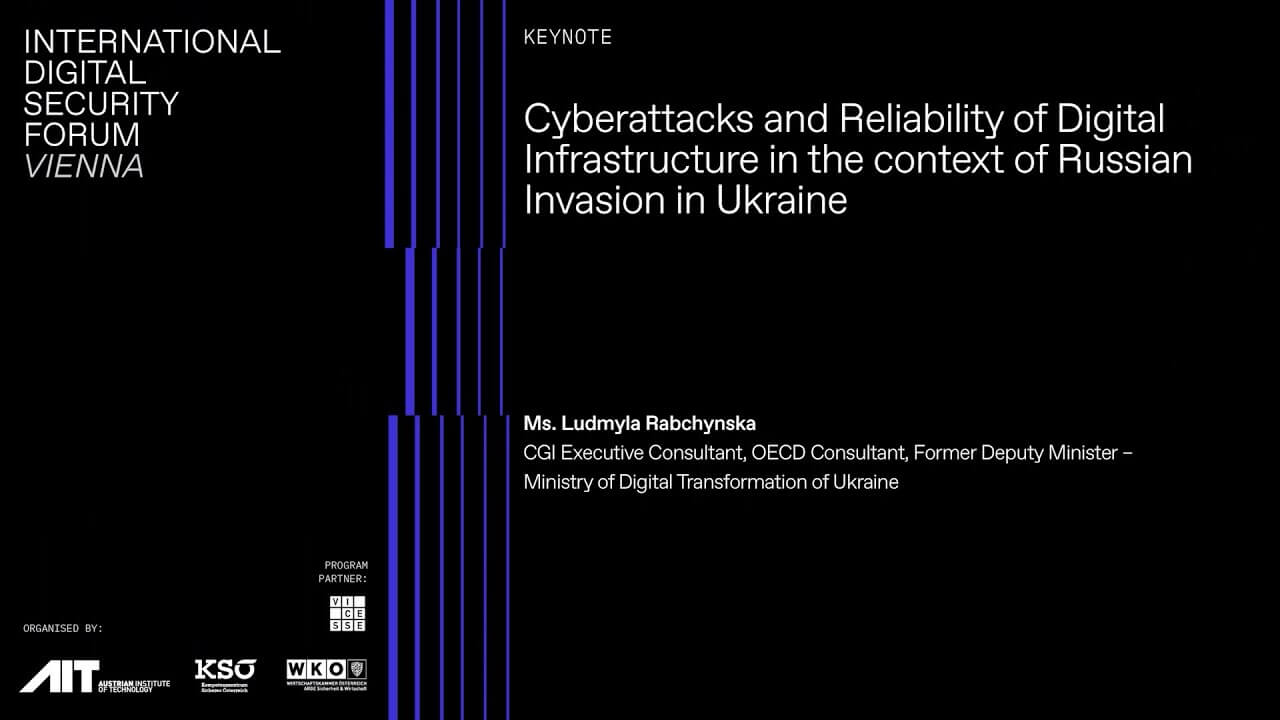
Ms. Ludmyla Rabchynska, CGI Executive Consultant, OECD Consultant, Former Deputy Minister – Ministry of Digital Transformation of Ukraine
While military actions in Ukraine attract quite a lot of attention from the world’s leading outlets, the cyber dimension of the war and the importance of digital infrastructure for the proper functioning of the state remains underestimated. Maybe that could have changed if one could take a nice and eye catching photo of a cyber attack (but pls not a usual guy in a hood over his head staring at a monitor). Russia has been trying to destroy Ukraine’s critical infrastructure with cyber attacks for many years with a few successes. Digital infrastructure not only survived, but also became a major tool for the Government to reach to the people and provide basic services.
Session 4.4
Innovative Security Technology Funding Systems & Partnerships
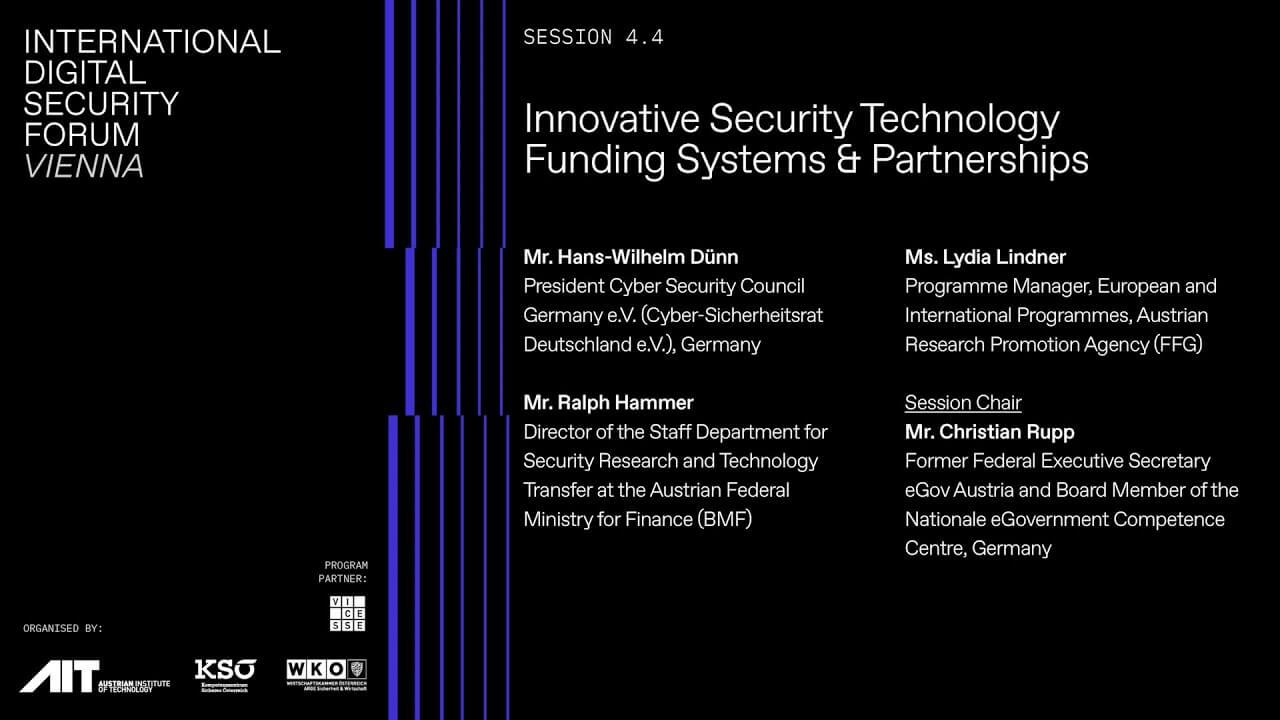
Session Panelists:
Mr. Hans-Wilhelm Dünn,
Mr. Ralph Hammer,
Ms. Lydia Lindner,
Session Chair:
Mr. Christian Rupp
Technology has become an integral part of our daily lives, transforming the way we communicate, work, and interact with the world. The digital security domain is complex and diverse, encompassing areas such as cybersecurity, data protection, privacy, and encryption. To address these challenges effectively, competent partners and stakeholders are essential. European funding programmes for security research, alongside national initiatives like the Austrian KIRAS programme, serve as exemplary models for fostering innovation in the digital security field. These funding frameworks provide a solid foundation for collaborative research, development, and implementation of cutting-edge technologies and practices. By bringing together experts, researchers, and industry leaders from various disciplines and backgrounds, these programmes create a vibrant ecosystem that ensures the security and resilience of our digital infrastructure, protecting individuals, businesses, and society as a whole.
SOCIAL SCIENCE TRACK – (De-)Centralisation of Digital Infrastructures
Welcome and introduction to the Social Science Track
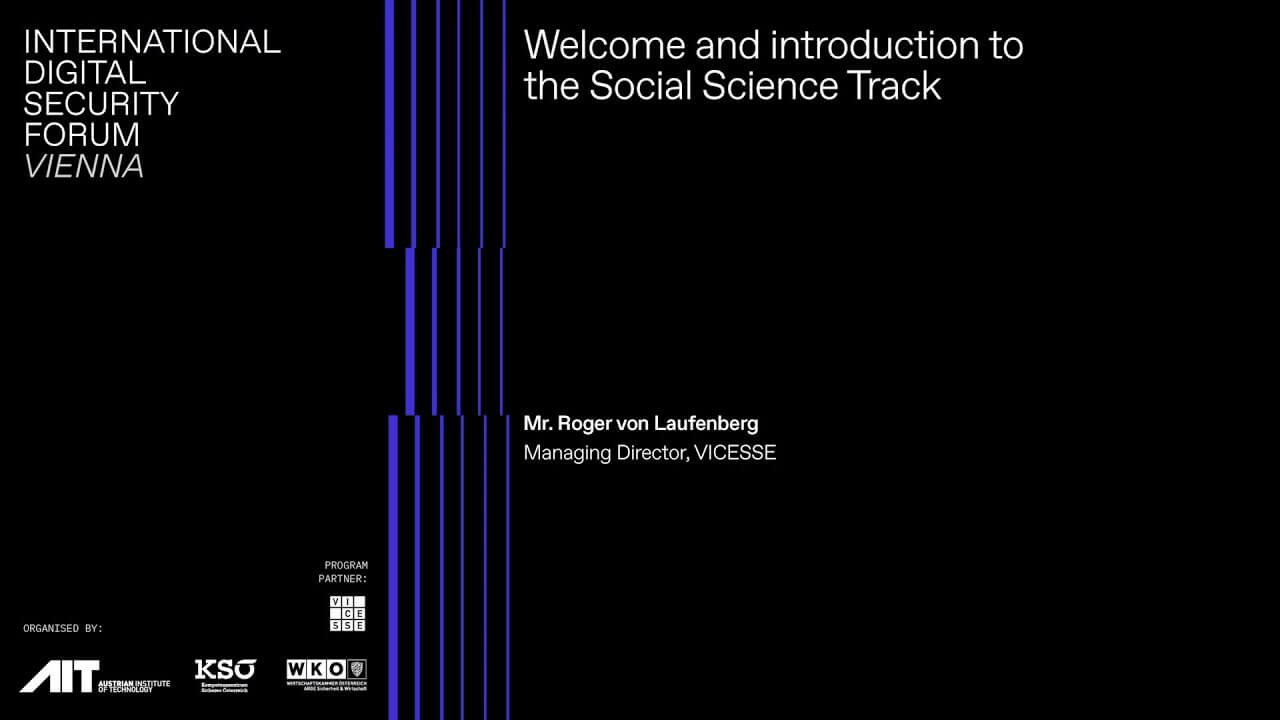
Mr. Roger von Laufenberg, Managing Director, VICESSE
Keynote
Open-Source Intelligence and Energy Infrastructures
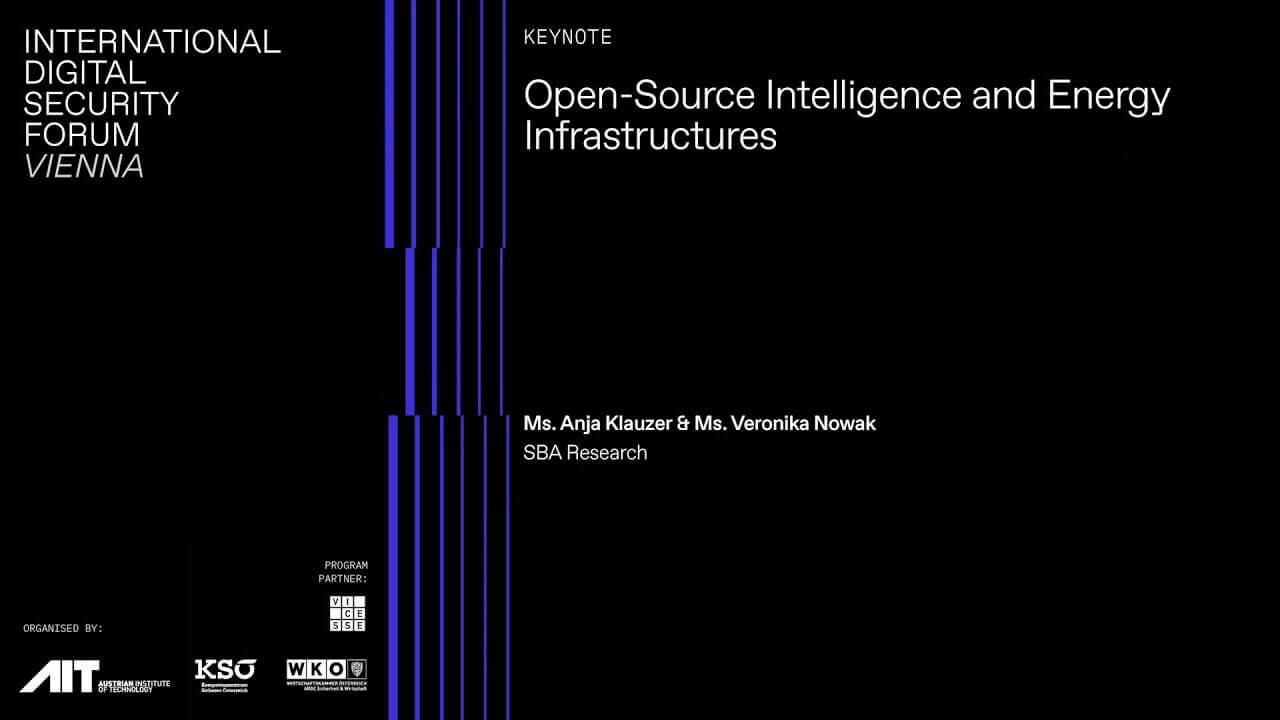
Ms. Anja Klauzer & Ms. Veronika Nowak, SBA Research
SESSION 1
Digital Infrastructures and Supply Infrastructures
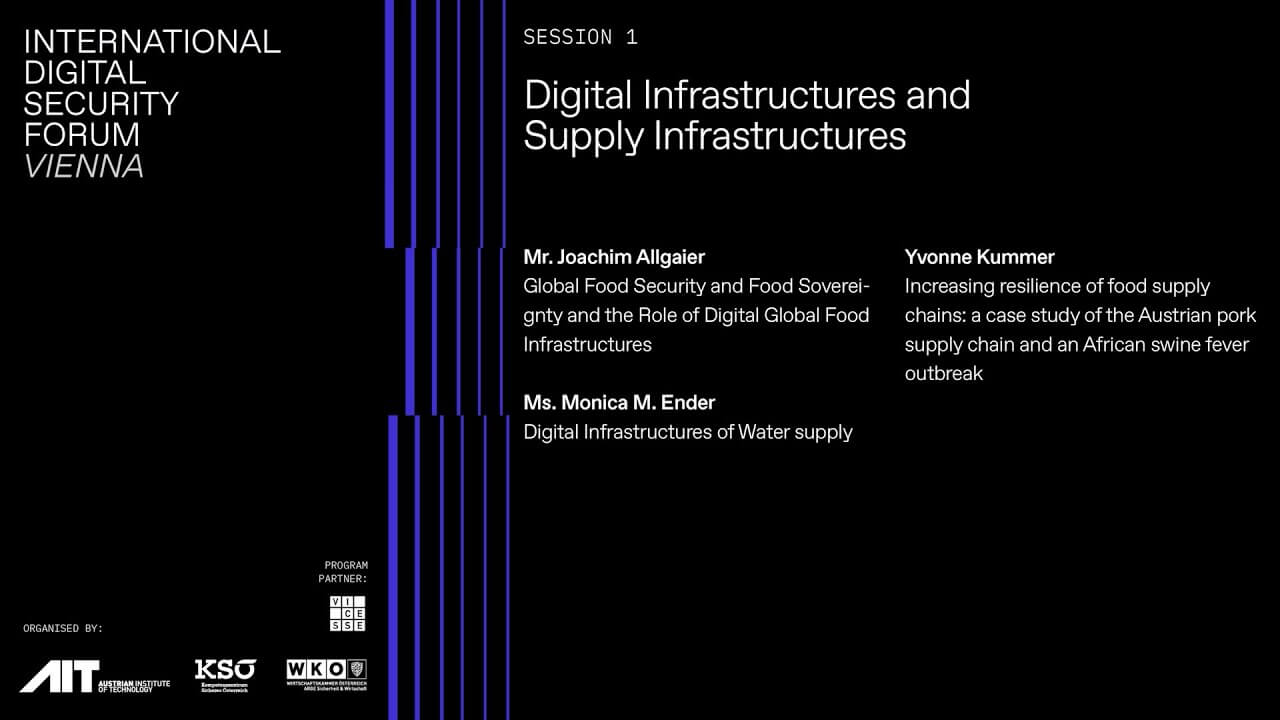
Mr. Joachim Allgaier: Global Food Security and Food Sovereignty and the Role of Digital Global Food Infrastructures
Ms. Monica M. Ender: Digital Infrastructures of Water supply
Yvonne Kummer: Increasing resilience of food supply chains: a case study of the Austrian pork supply chain and an African swine fever outbreak
Research and Innovation for an Open, Inclusive and Secure Society
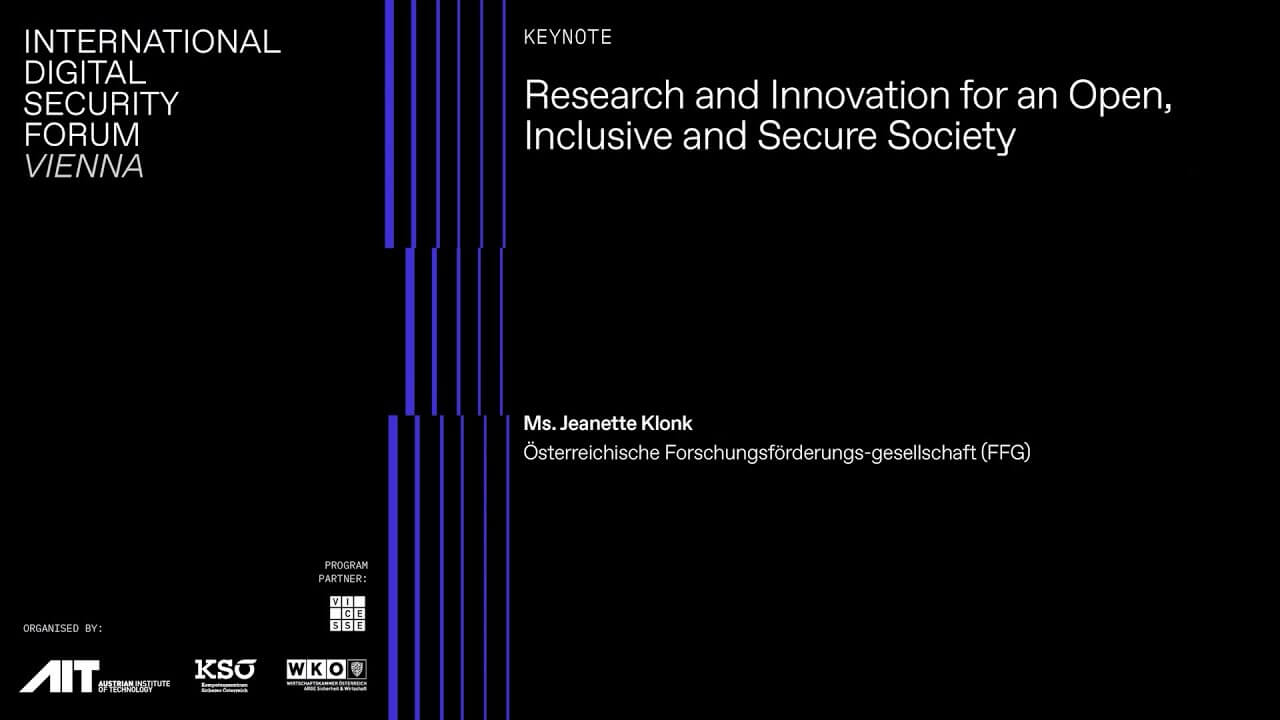
Ms. Jeanette Klonk, Österreichische Forschungsförderungs-gesellschaft (FFG)
SESSION 2
The power of Social Media Platforms
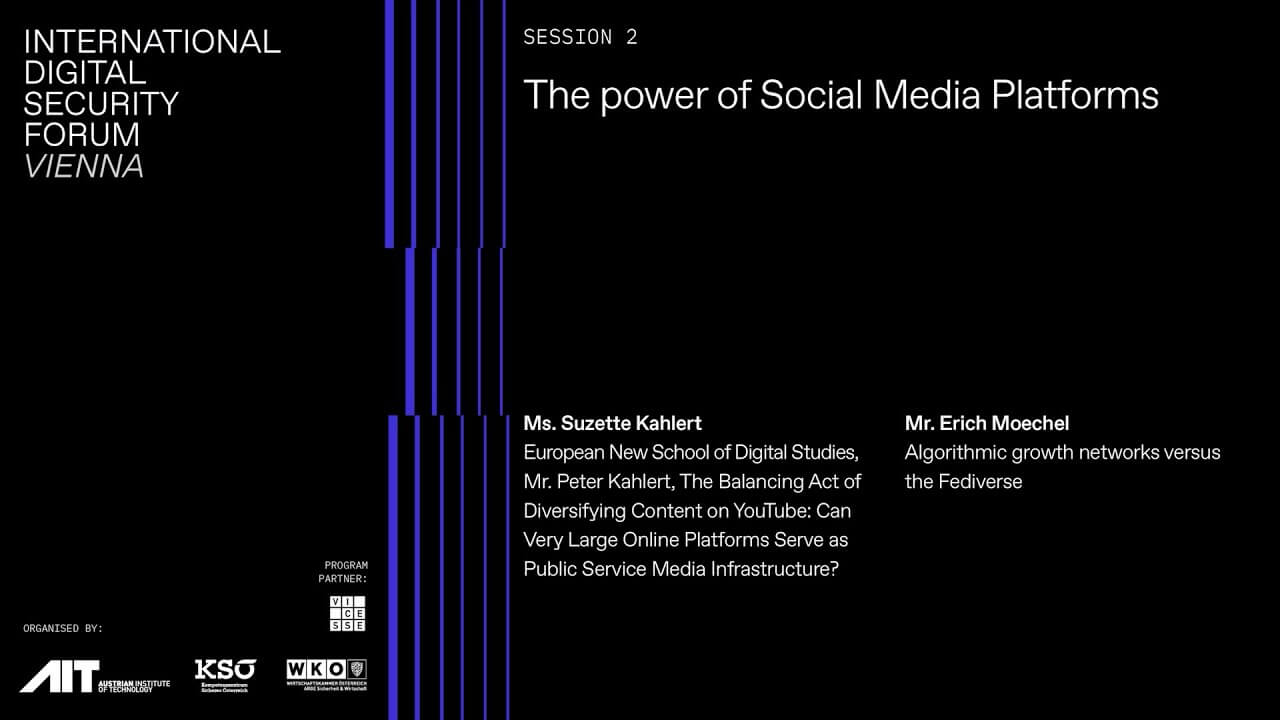
Ms. Suzette Kahlert,
Mr. Peter Kahlert: The Balancing Act of Diversifying Content on YouTube: Can Very Large Online Platforms Serve as Public Service Media Infrastructure?
Mr. Erich Moechel: Algorithmic growth networks versus the Fediverse
SESSION 3
Digital Infrastructures of governance
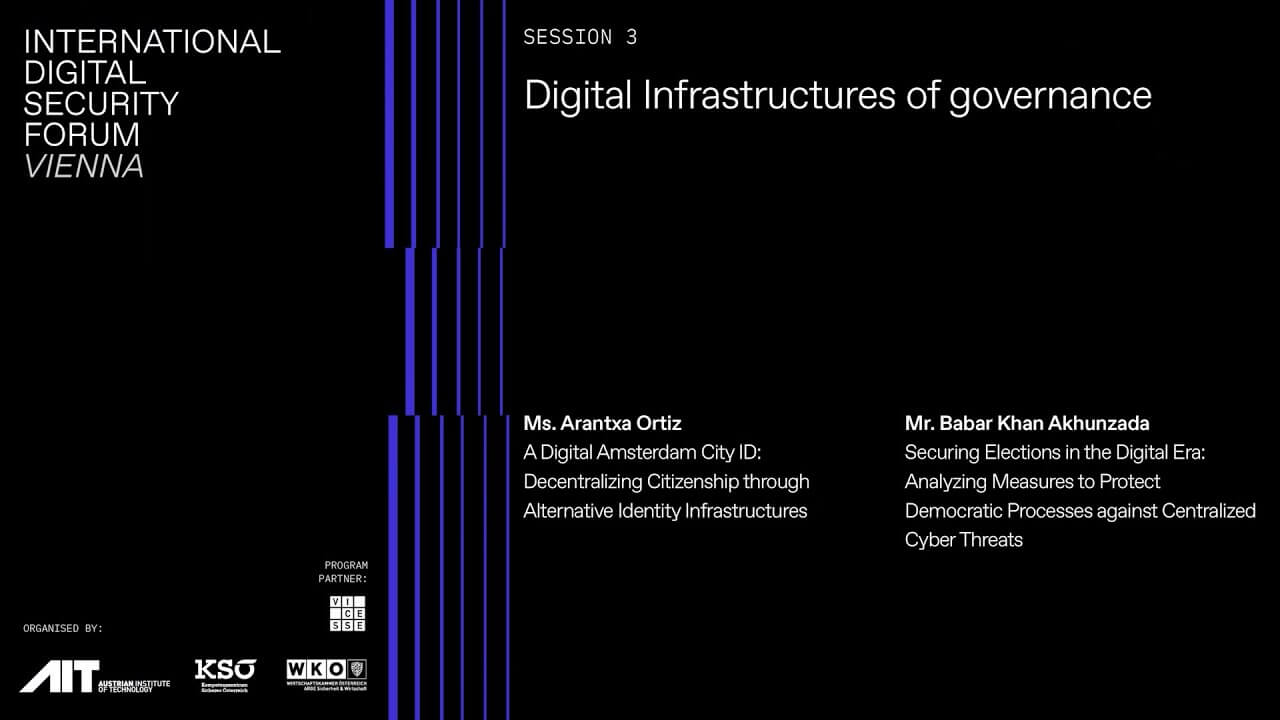
Ms. Arantxa Ortiz: A Digital Amsterdam City ID: Decentralizing Citizenship through Alternative Identity Infrastructures
Mr. Babar Khan Akhunzada: Securing Elections in the Digital Era: Analyzing Measures to Protect Democratic Processes against Centralized Cyber Threats
SESSION 4
Hypercriticality: Establishing Safety and Security of entangled infrastructures (Roundtable)
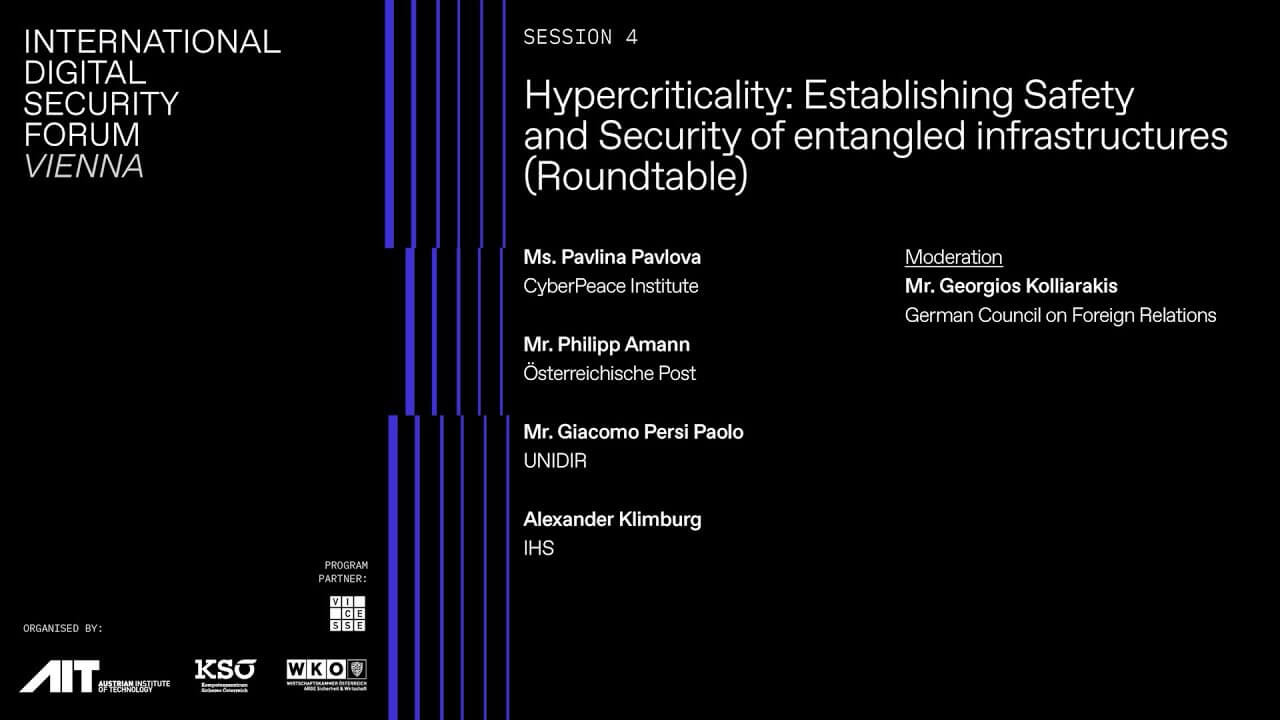
Ms. Pavlina Pavlova, CyberPeace Institute;
Mr. Philipp Amann, Österreichische Post; Mr. Samuele Dominioni, UNDIR;
Mr. Alexander Klimburg, HIS
Moderation:
Mr. Georgios Kolliarakis, German Council on Foreign Relations
In December of 2022, two interrelated EU directives came into effect: Directive 2022/2555 addressing measures to establish a high level of cybersecurity uniformity across the Union, and Directive 2022/2557 on enhancing the resilience of critical entities (CE). Also at OECD level the 2022 Policy Framework on Digital Security, and the OECD Council Recommendation on the Governance of Infrastructure point to the pivotal role of CE in upholding vital societal functions, from energy, transport, water, production and distribution of food, public health, and financial services. The convergence and interdependence of physical and digital infrastructures generates a kind of hypercriticality, both in the sense that the functions are of vital importance, and in the sense that they are subject to new vulnerabilities.
Opening Speech Day 3
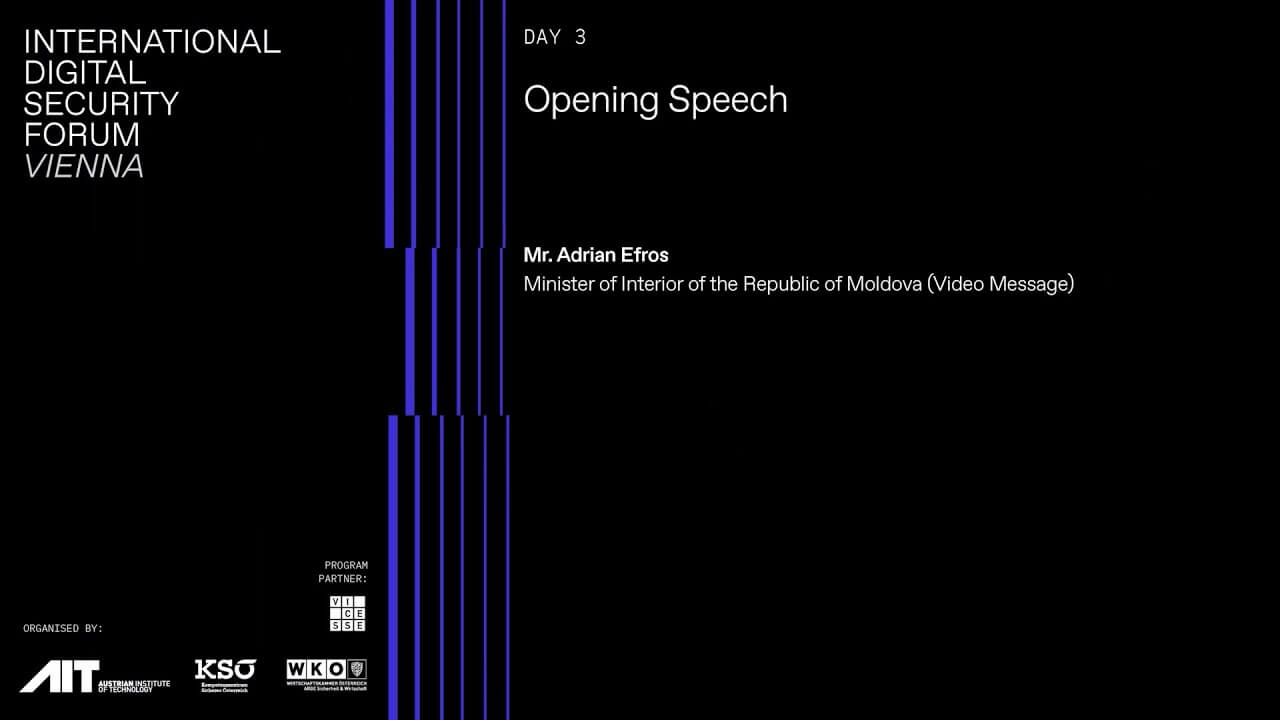
Mr. Adrian Efros, Minister of Interior of the Republic of Moldova (Video Message)
KEYNOTE
A never-ending battle: How to build and maintain societal resilience to foreign malign influence
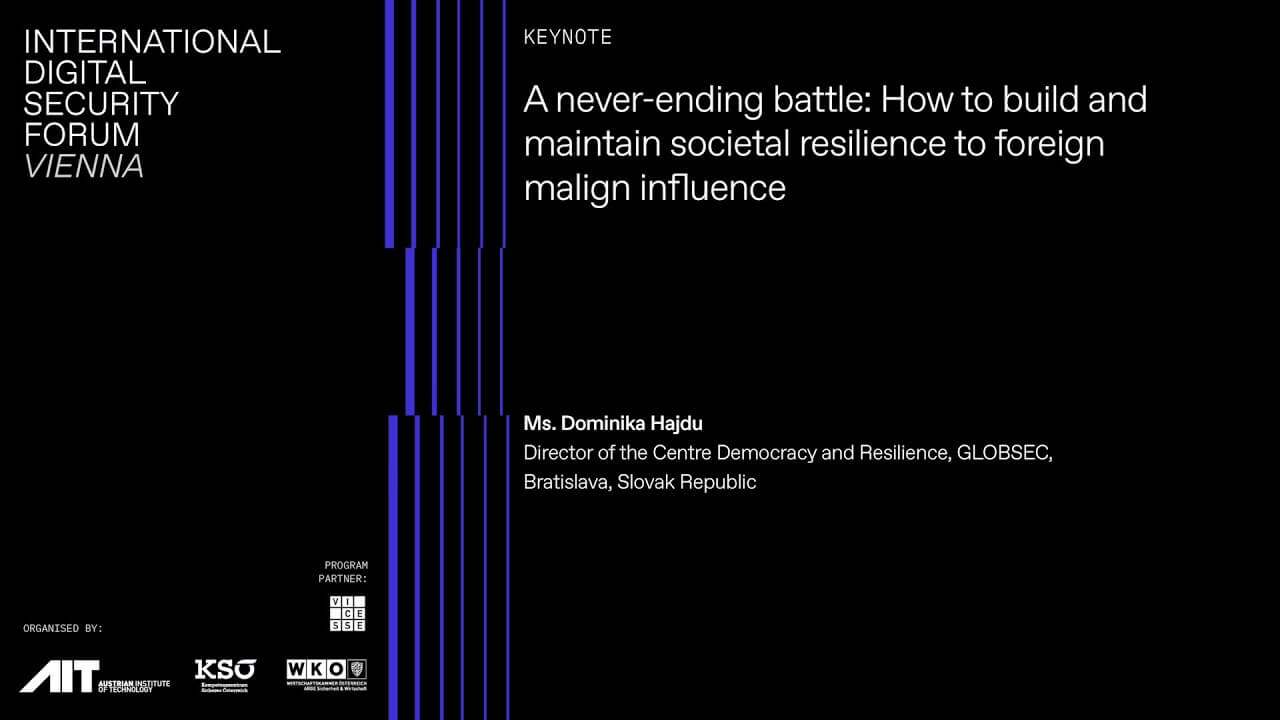
Ms. Dominika Hajdu, Director of the Centre Democracy and Resilience, GLOBSEC, Bratislava, Slovak Republic
SESSION TRACK 5 – Cyber Security
SESSION 5.1
Data Economy – The Next Disruptive Challenge: Establishing trustworthy and secure data exchange eco-systems
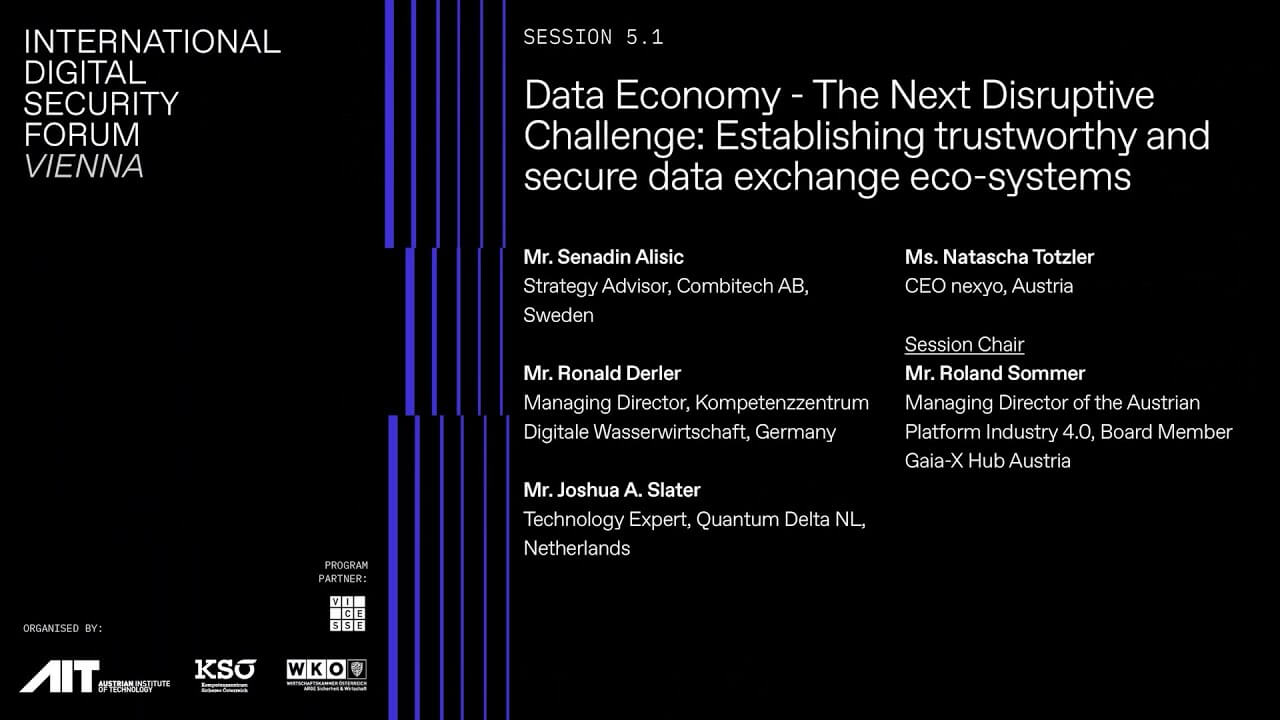
Session Panelists:
Mr. Senadin Alisic,
Mr. Ronald Derler,
Mr. Joshua A. Slater,
Ms. Natascha Totzler,
Session Chair:
Mr. Roland Sommer
The increasing availability of data across industries is driving innovation and enables new business models. Having data available throughout the product life cycle, helps to increase resilience, user experience and quality, while also optimizing the usage of resources and decreasing the carbon footprint. Exchanging data across companies, however, requires trust. This trust needs to be established on multiple levels, including the underlying infrastructure, the data and involved actors, as well as exchange and processing of the data. In order to create this trust, harmonized processes and interfaces, as well as harmonized validation mechanisms are needed. In this session, experts from different industries will discuss the requirements for establishing trustful data exchange and outline how this will affect businesses and public administration.
SESSION 5.2
Securing the Energy Sector: Strategies for Building Resilience against Cyber Attacks
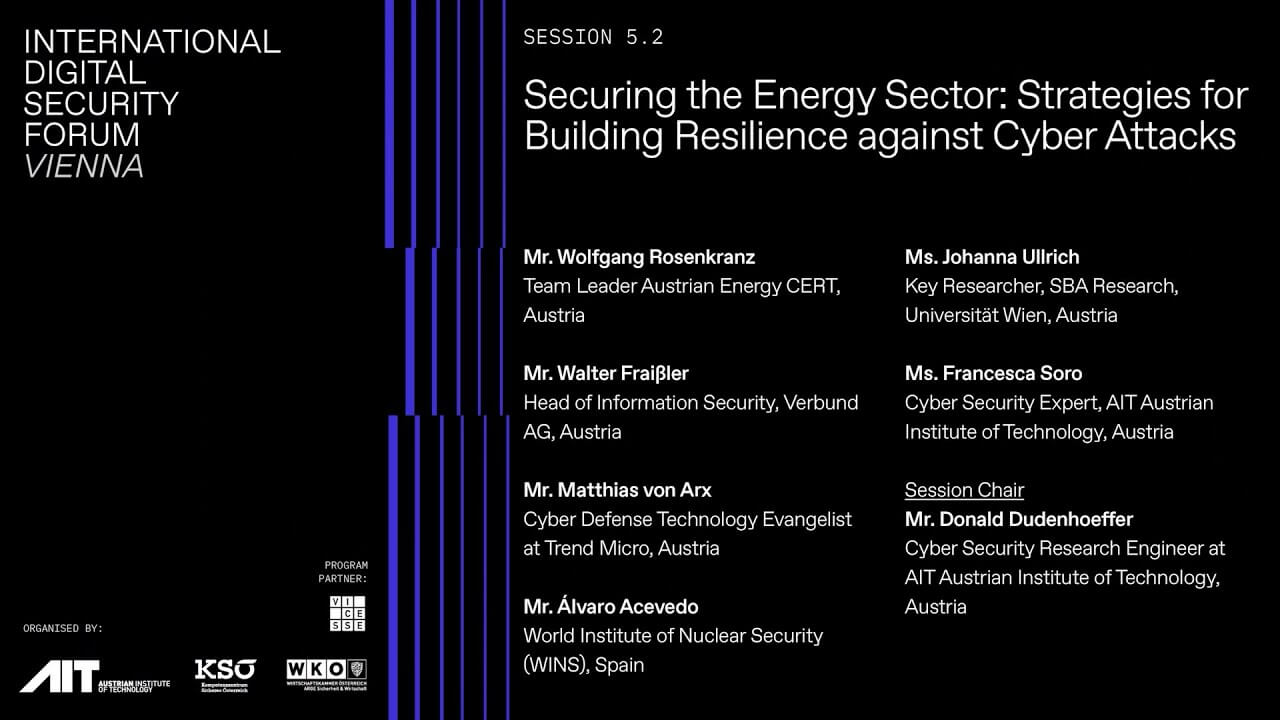
Session Panelists:
Mr. Wolfgang Rosenkranz,
Mr. Walter Fraißler,
Mr. Matthias von Arx,
Mr. Álvaro Acevedo,
Ms. Johanna Ullrich,
Ms. Francesca Soro
Session Chair:
Mr. Donald Dudenhoeffer
Energy Security is vital for the safety and security of today’s societies and economies. Protecting it is a matter of national security. The energy sector consists of a complex supply chain with activities ranging from raw material exploration to customer deliver. Digital transformation has been embraced by the Energy Sector and has improved the safety and efficiency of operations but has likewise exposed it to potential cyber vulnerabilities. Threat actors likewise recognize it’s vital importance and have made the Energy Sector a primary target. This session addresses initiatives and actions to build resilience against cyber-attack in the Energy Sector
SESSION 5.3
Bridging the Gap: Strategies for Global Collaboration between Security, Standardization and Policy Making Communities
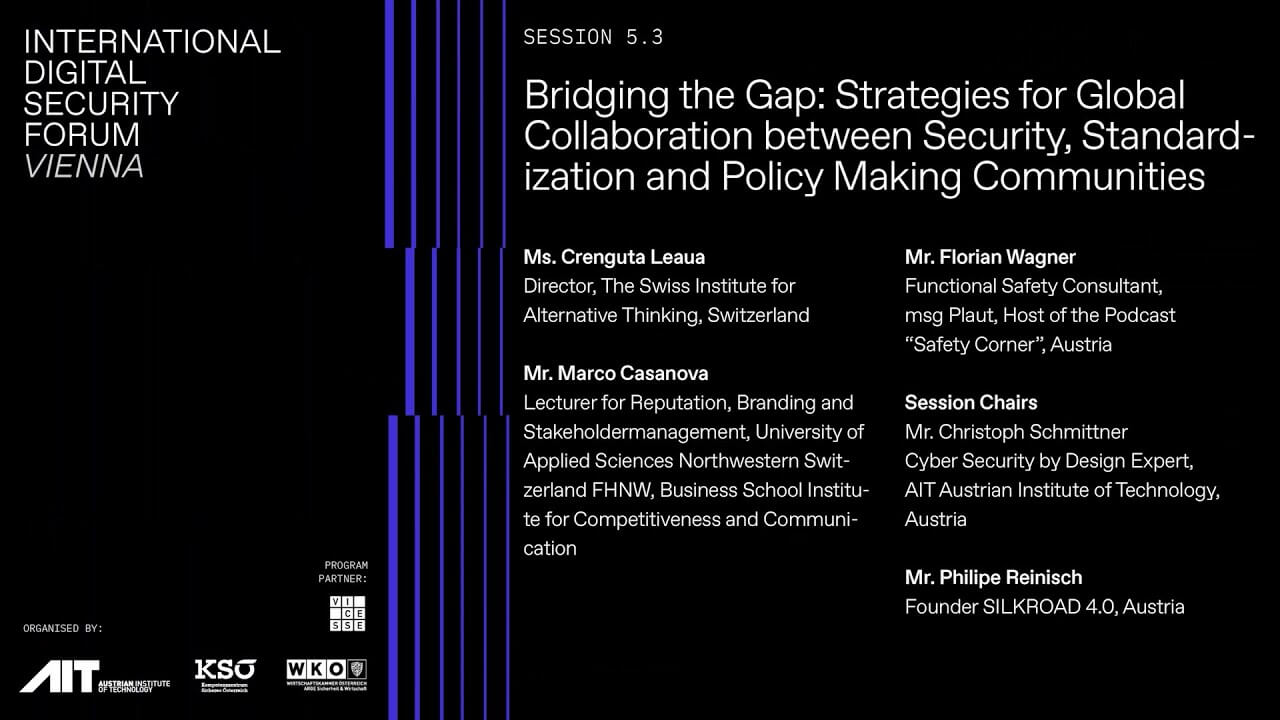
Session Panelists:
Crenguta Leaua,
Mr. Florian Wagner,
Mr. Marco Casanova
Session Chair:
Mr. Christoph Schmittner,
Mr. Philipe Reinisch
In this session the participants will start from the automotive industry as an example of a domain, were regulations and guidelines regarding cybersecurity are already in place. The panel will delve into the processes and capabilities that manufacturers must establish to obtain product approvals within this regulatory framework.
Expanding beyond the automotive sector, the speakers will discuss the broader implications of product and organization related cybersecurity regulation. The Cybersecurity Act requires risk-based approaches regarding product cybersecurity and enables certification of products/IoT systems. The session will also highlight the significance of NIS2 at the EU level and its influence on establishing cybersecurity standards and requirements on an organizational level. Drawing on the automotive industry’s experience, the panel will analyze how producing regulations impacts manufacturers and stakeholders across sectors.
Furthermore, the expert panel will emphasize the importance of Security by Design and its role in developing resilient systems. The participants will delve into model-driven system development approaches that prioritize safety and security from the earliest stages of product design.
The speakers will provide insights, share experiences, and discuss strategies to foster collaboration between security, standardization, and policy-making communities. Furthermore, they will explore how global initiatives and regulations shape the future of cybersecurity, certification processes, and the importance of embedding safety and security principles throughout the whole product development lifecycle.
Keynote
Unlocking and Protecting Value: Transforming Industrial Ecosystems and Smart Cities with Cybersecurity Vigilance
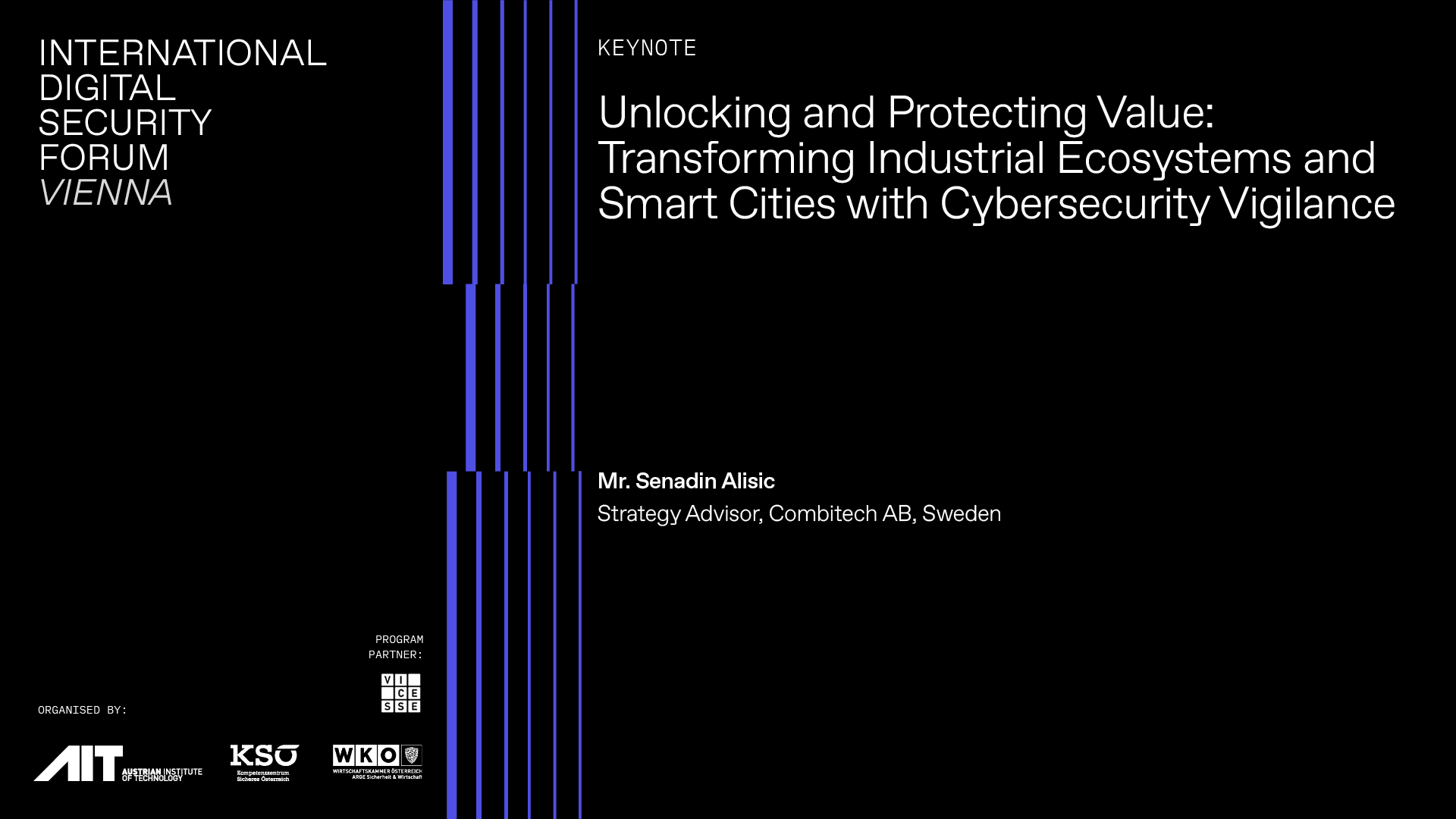
Mr. Senadin Alisic, Strategy Advisor, Combitech AB, Sweden
In today’s interconnected world, data has transcended its role as mere information, evolving into the modern currency that holds unparalleled potential to reshape industrial ecosystems and urban landscapes. As we stand at the crossroads of the data-driven revolution in industrial ecosystems and smart cities, the critical role of cybersecurity emerges as an unassailable imperative. Within this expanding tapestry of interconnectedness, ensuring the integrity, confidentiality, and accessibility of data ascends to a paramount mission.
This keynote delves into the data economy principles, revealing the latent value they harbor. By integrating these principles strategically, we not only enhance decision-making but also nurture collaboration within industrial contexts and the dynamic realm of smart city environments. This keynote will also illuminate the indelible significance of cybersecurity and cast a spotlight on its pivotal role in safeguarding and propelling the progress catalyzed by data economy principles across the industry.
Join us on discussion as we navigate the convergence of data economy and cybersecurity and explore the intricate interplay between these two forces.
SESSION 5.4
Building Cyber Resilience: National Strategies for Capacity Development in Cybersecurity
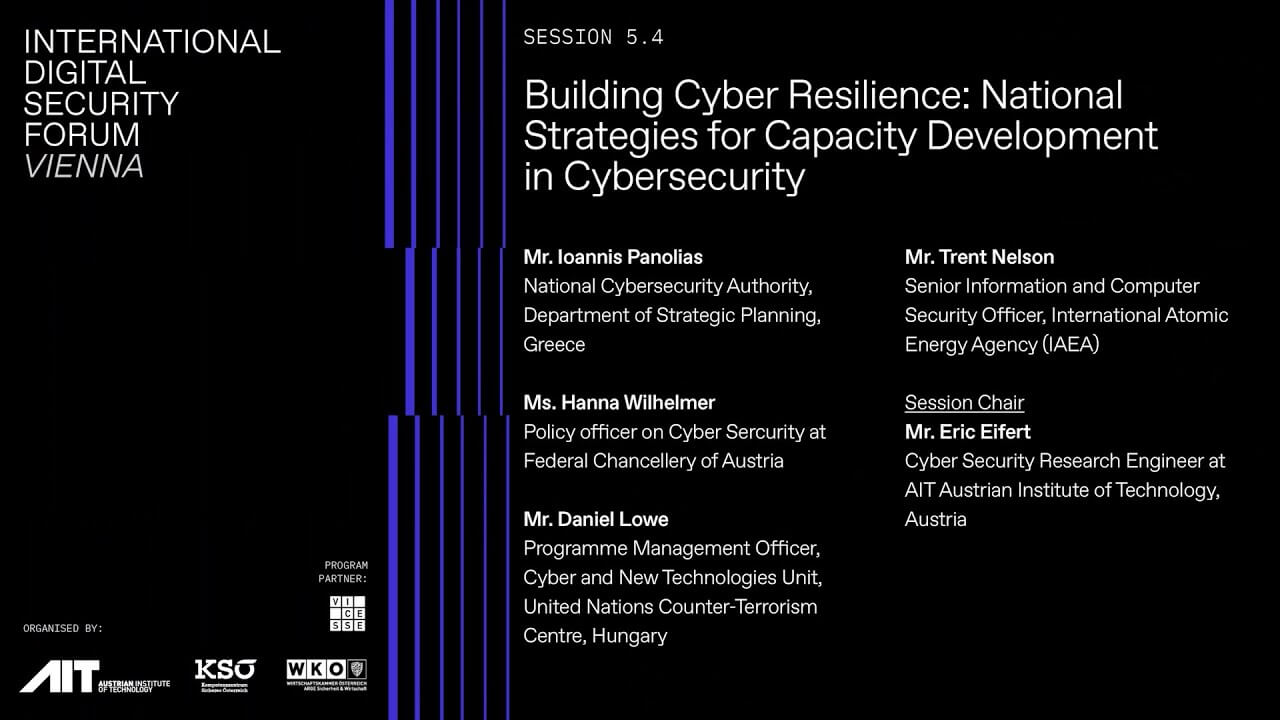
Session Panelists:
Mr. Ioannis Panolias,
Ms. Hanna Wilhelmer,
Mr. Daniel Lowe,
Mr. Trent Nelson
Session Chair:
Mr. Eric Eifert
Establishing and sustaining a core cyber security capability is the one of the key enablers for building protection and resilience against cyber exploitation. This is true at the organizational level but also extends to the national level. Building cyber security capacity and maintaining it while key, is still one of the most challenging aspects of a cyber security program. There simply is not enough talent to fill to need as shown by the millions of job vacancies for cyber security experts that have existed for the past 5-10 years. In an environment where digital transformation and the ongoing rise of cybercrime, organizations and States must develop strategies for building and sustaining cyber security talent. This session presents strategies adopted by organizations along with their success and challenges.
SESSION 5.5
Navigating the EU Data Strategy: Challenges and Opportunities for Industry and Public Authorities
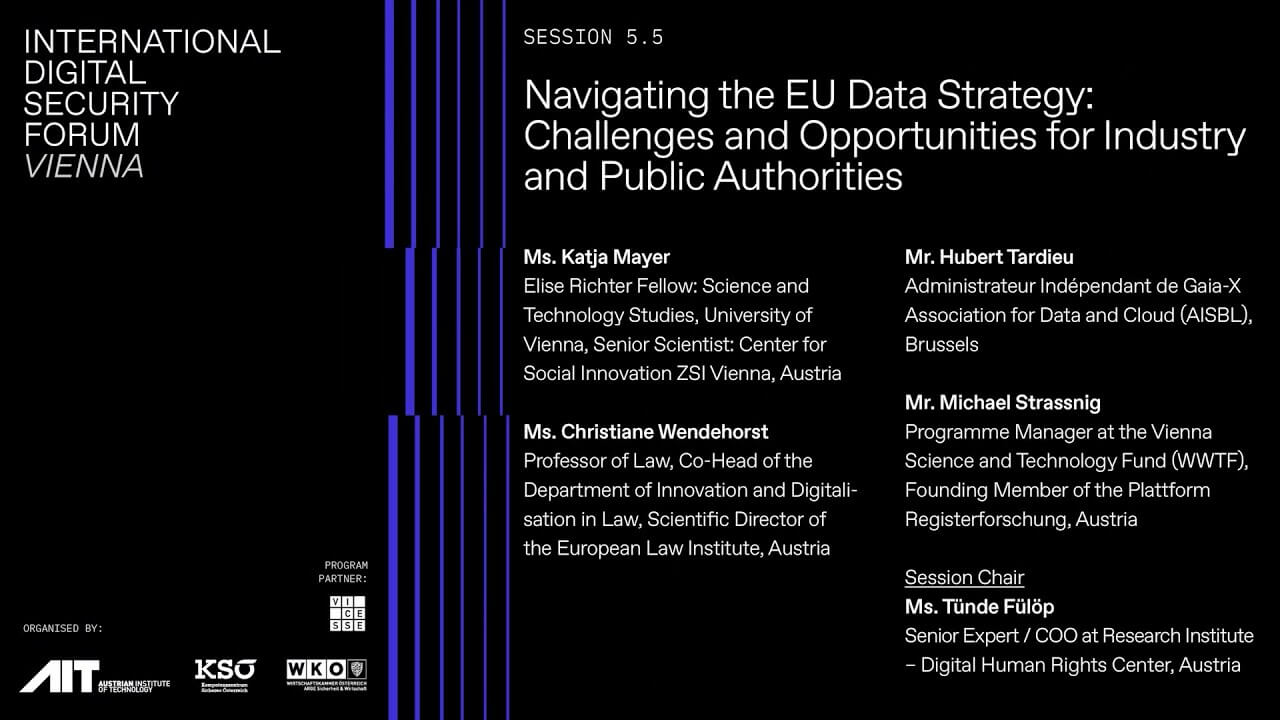
Session Panelists:
Ms. Katja Mayer,
Ms. Christiane Wendehorst,
Mr. Hubert Tardieu,
Mr. Michael Strassnig,
Session Chair:
Ms. Tünde Fülöp
Availability of high-quality data is essential for developing data centric applications including AI and for enabling the data driven economy. The EU data strategy aims to create common European data spaces and to unlock the potential of data with a view to enhance global competitiveness and European data sovereignty.
The panel will discuss the new Data Governance Act and the upcoming Data Act which will introduce, among others, easier access to government data, facilitation of data sharing via data intermediaries, the concept of data altruism, and rules governing the sharing of data generated using connected (IoT) products or related services. Aspects like enhanced data portability and restrictions on data transfers to third countries shall be critically assessed. The panel will discuss the impact of these regulations and discuss, how they interlink with technical initiatives like SIMPL or Gaia-X to enable the future European data economy.
Closing
Closing Speech
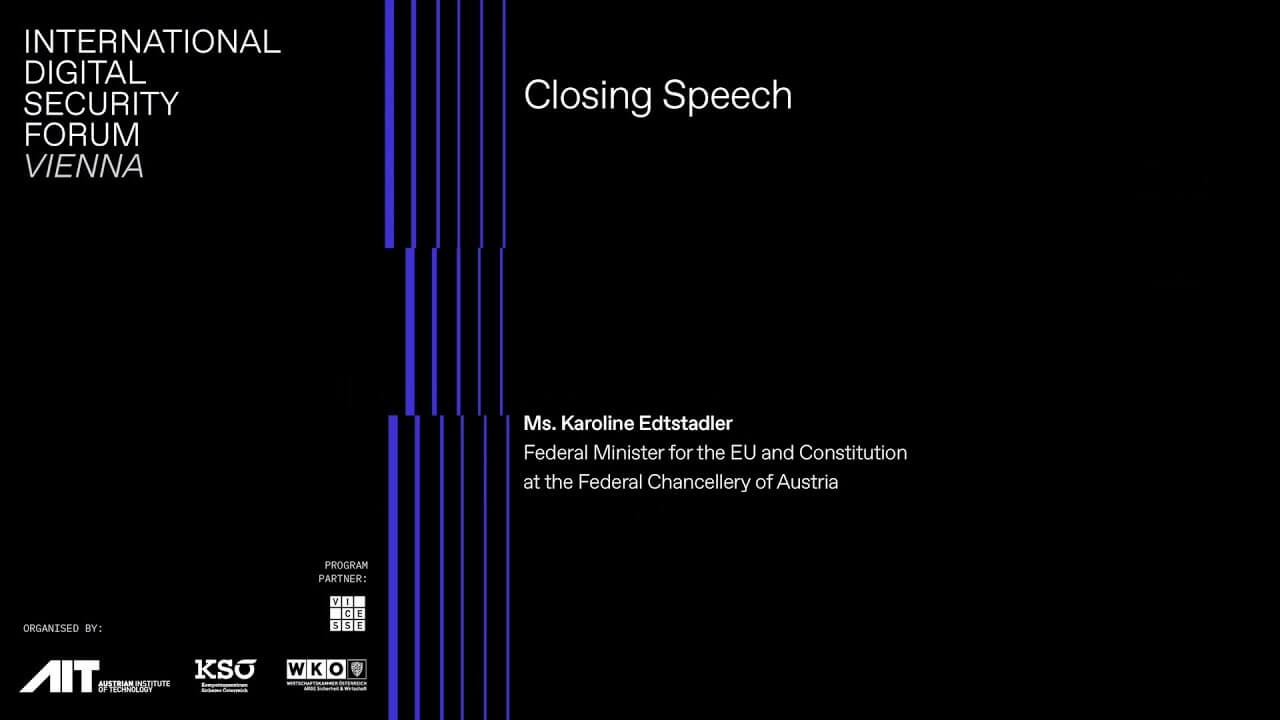
Ms. Karoline Edtstadler, Federal Minister for the EU and Constitution at the Federal Chancellery of Austria
Conference Closing of IDSF23
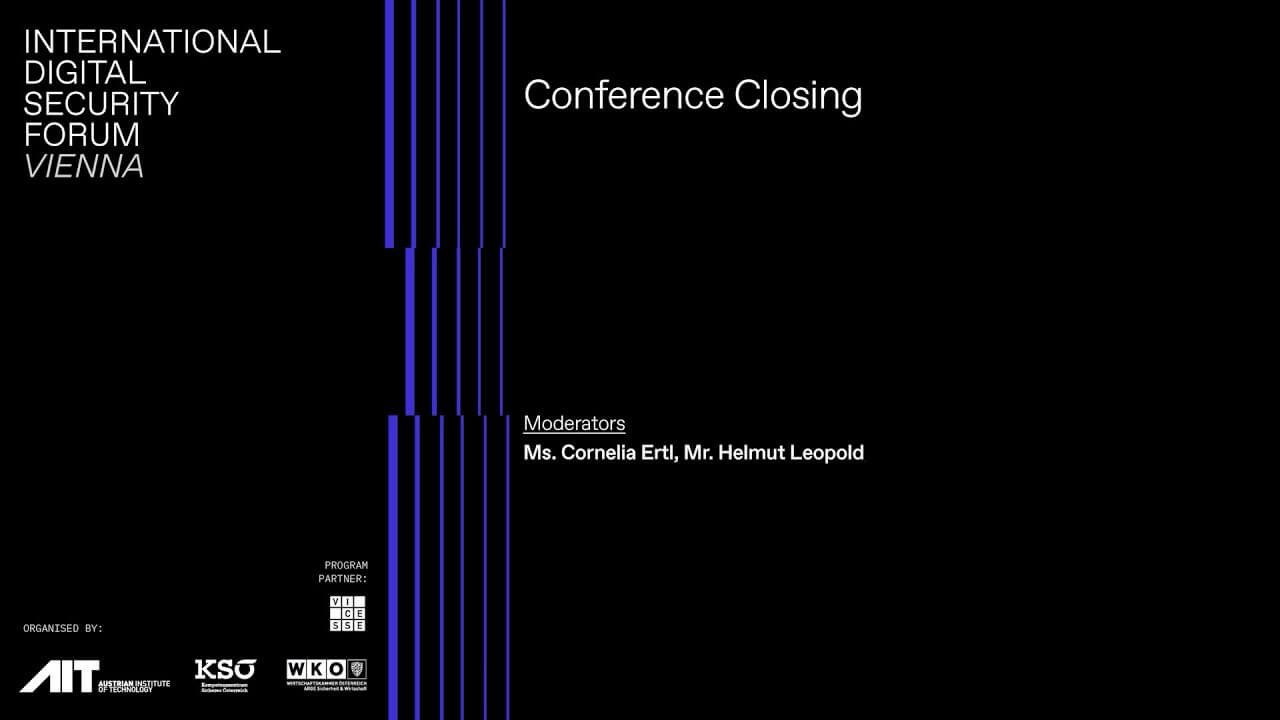
Moderator:
Ms. Cornelia Ertl,
Mr. Helmut Leopold